Our Impact
At JGSHI, we are committed to making a tangible and lasting impact across key areas. Our initiatives are designed to improve the way we do business while addressing critical challenges. We focus on climate action, resource efficiency, partner and community engagement, employee well-being, and innovative solutions. By integrating sustainability into our business model, we aim to create long-term value for our stakeholders. Our efforts include modernizing operations, supporting local communities, and fostering a culture of continuous improvement. Through collaboration and strategic partnerships, we strive to build a resilient and sustainable future for all.
Robinsons Malls Nationwide Job Fairs: Empowering Communities and Expanding Opportunities
Robinsons Malls' nationwide Job Fair Initiative exemplifies Stewardship by fostering economic empowerment and community development. In collaboration with the Department of Labor and Employment (DOLE) and the Public Employment Service Office (PESO), this program directly connects job seekers with employment opportunities, ensuring financial stability and meaningful careers. By actively addressing employment gaps, Robinsons Malls has successfully partnered with government agencies and private companies to bring career opportunities closer to communities.
The initiative spans 47 malls nationwide, hosting 120 job fairs that attracted over 50,000 applicants. Additionally, 3,274 exhibitors participated, broadening the range of job opportunities available across multiple industries. These figures highlight the initiative’s role in enhancing workforce participation and economic sustainability.
A key success story is the Robinsons Iloilo Job Fair, which saw thousands of job seekers qualify and hundreds hired on the spot. With participation from 120 companies—including 88 local businesses, 12 overseas employment agencies, and 20 BPO firms—the event positioned Iloilo as an emerging employment hub. PESO-Iloilo’s recognition by the Overseas Workers Welfare Administration (OWWA) for its dedication to overseas Filipino workers further underscores the program’s positive impact.
Beyond job placement, the initiative aligns with the government’s employment generation goals, providing structured recruitment processes and reducing barriers to employment. The partnership with the Department of Agriculture’s (DA) Kadiwa Program also promotes job creation within the agricultural sector, encouraging youth and rural communities to view agriculture as a viable and modern industry. This contributes to regional economic balance and discourages urban migration, further strengthening national development.
What makes this initiative unique is its scale and holistic approach. Unlike traditional recruitment efforts, Robinsons Malls leverages its extensive nationwide presence to deliver employment solutions directly to local communities. By working closely with government agencies, the initiative ensures that job seekers, including marginalized groups such as youth and persons with disabilities, have access to meaningful employment that matches their skills and aspirations. The program also upholds ethical hiring practices, fostering transparency and trust between employers and job seekers.
The measurable impact of the initiative is substantial. With over 50,000 job seekers engaged, and thousands of employers benefiting from streamlined recruitment, Robinsons Malls has established itself as a key driver of employment facilitation. Employers gain access to pre-screened talent, optimizing recruitment costs and reducing hiring time, while government agencies benefit from a structured and efficient employment generation platform.
Ultimately, the initiative contributes to increased household incomes, financial stability, and overall economic productivity. By continuously bridging the gap between job seekers and employers, Robinsons Malls demonstrates its commitment to social responsibility, workforce development, and sustainable economic growth. Through innovation, strategic partnerships, and a steadfast dedication to community engagement, the Job Fair Initiative is shaping brighter futures—one job at a time.
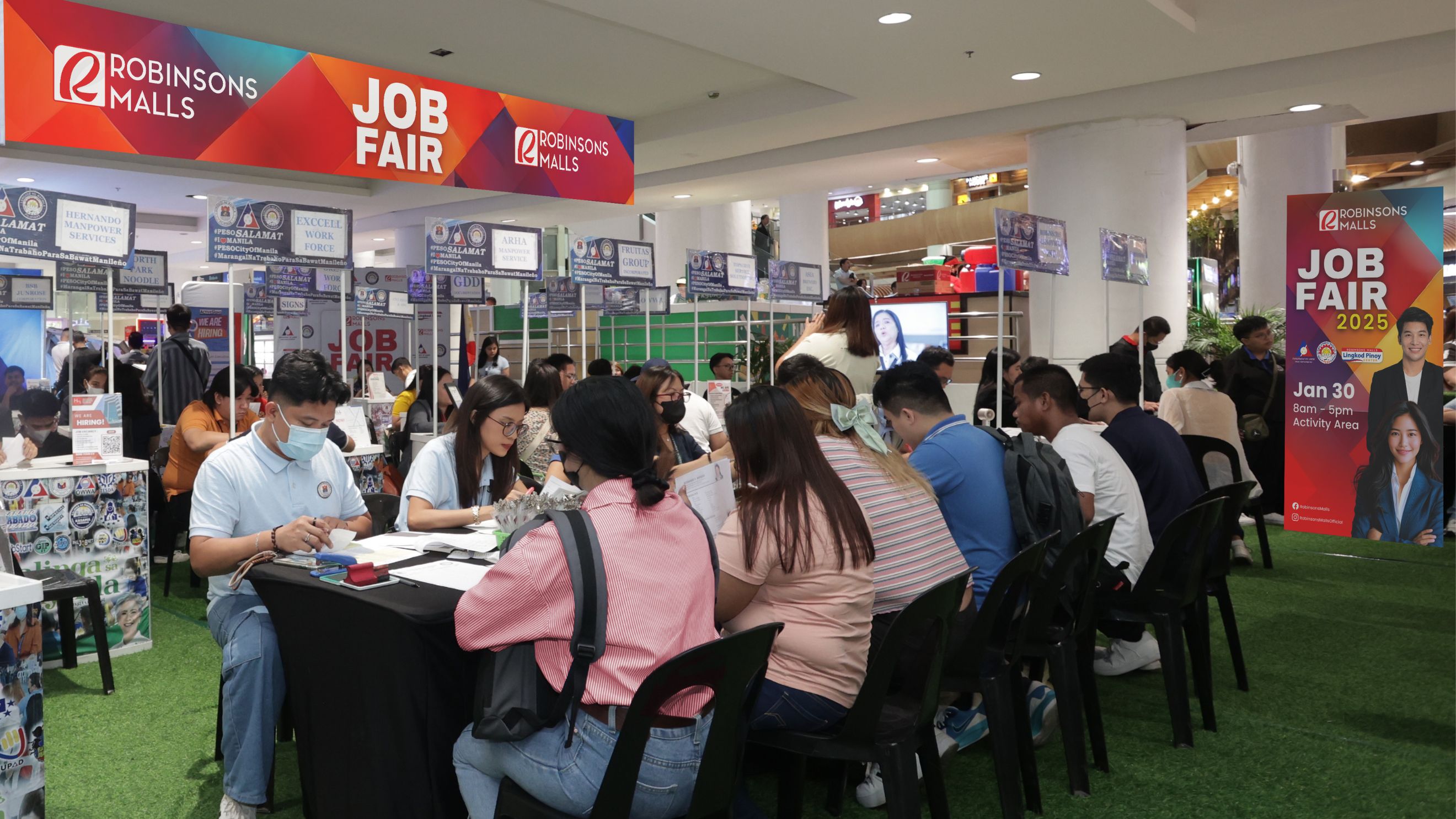
#JuanCommitment 2024 Impacting Employees and Communities Through Volunteerism
Guided by the #JuanCommitment volunteerism program, JGSHI and RRHI made significant strides in their nation-building mission through education in 2024. This initiative exemplifies the Group’s fundamental value of stewardship, actively engaging employees in meaningful ways to support local schools with essential resources and community service.
Building upon the strong foundation established in previous years, #JuanCommitment has expanded its impact by empowering our dedicated employees to contribute their time, treasure, and talent to their respective communities. Also rooted in Mr. John Gokongwei Jr.’s living mission for education, our objective in 2024 was to deepen our connections with local communities, underscoring our unwavering commitment to education.
Over 1,591 employees participated and collaborated to accrue 6,192 hours of volunteer time. This remarkable teamwork benefited 100 schools nationwide, each receiving PHP 20,000 in-kind donations. In addition to this support, our employees facilitated the provision of school supplies and equipment and organized various community services like clean-up drives, facility refurbishments, restoration, and beautification activities. All these acts of kindness created a positive ripple effect throughout the communities we have served.
Furthermore, #JuanCommitment has generated an impressive PHP 807,934 in donations from various donors, particularly from different business units of the Group and employees, topping up the initial PHP 2 million contribution from the Gokongwei Brothers Foundation (GBF). These community efforts have impacted 200,000 individuals, including students, educators, and parents, spreading hope and opportunity throughout the region.
#JuanCommitment aligns seamlessly with the JGSHI and RRHI’s strategic goals of sustainability, particularly in community development and education. By fostering a culture of volunteerism, we empower our employees to act as catalysts for positive change within their communities.
This program's achievements reflect the collaborative efforts among key stakeholders. Significant support came from GBF, Corporate Affairs and Sustainability (CAS), and Corporate Human Resources (CHR), all of which worked closely with our business units to identify schools in need, coordinate volunteer activities, and ensure effective resource allocation.
Our structured approach has facilitated these accomplishments, which include:
- Conducting needs assessments to understand the unique requirements of schools.
- Organizing employee volunteer sign-ups and hosting orientation sessions.
- Managing logistics to streamline donations and refurbishments.
- Coordinating on-site activities such as clean-up drives and general services.
- Documenting outcomes to track the program's impact comprehensively.
The overwhelmingly positive results of #JuanCommitment in 2024 underscored the significant role of employee volunteerism in generating meaningful impact. This initiative has provided essential support to schools and fostered a strong sense of community and purpose among our employees.
Looking ahead, JGSHI and RRHI are committed to further enhancing the #JuanCommitment program for nation-building. By investing in these initiatives, we aspire to empower our employees to create lasting change in the lives of Filipinos, thereby paving the way for a brighter and more equitable future through education. Together, we can achieve meaningful progress.
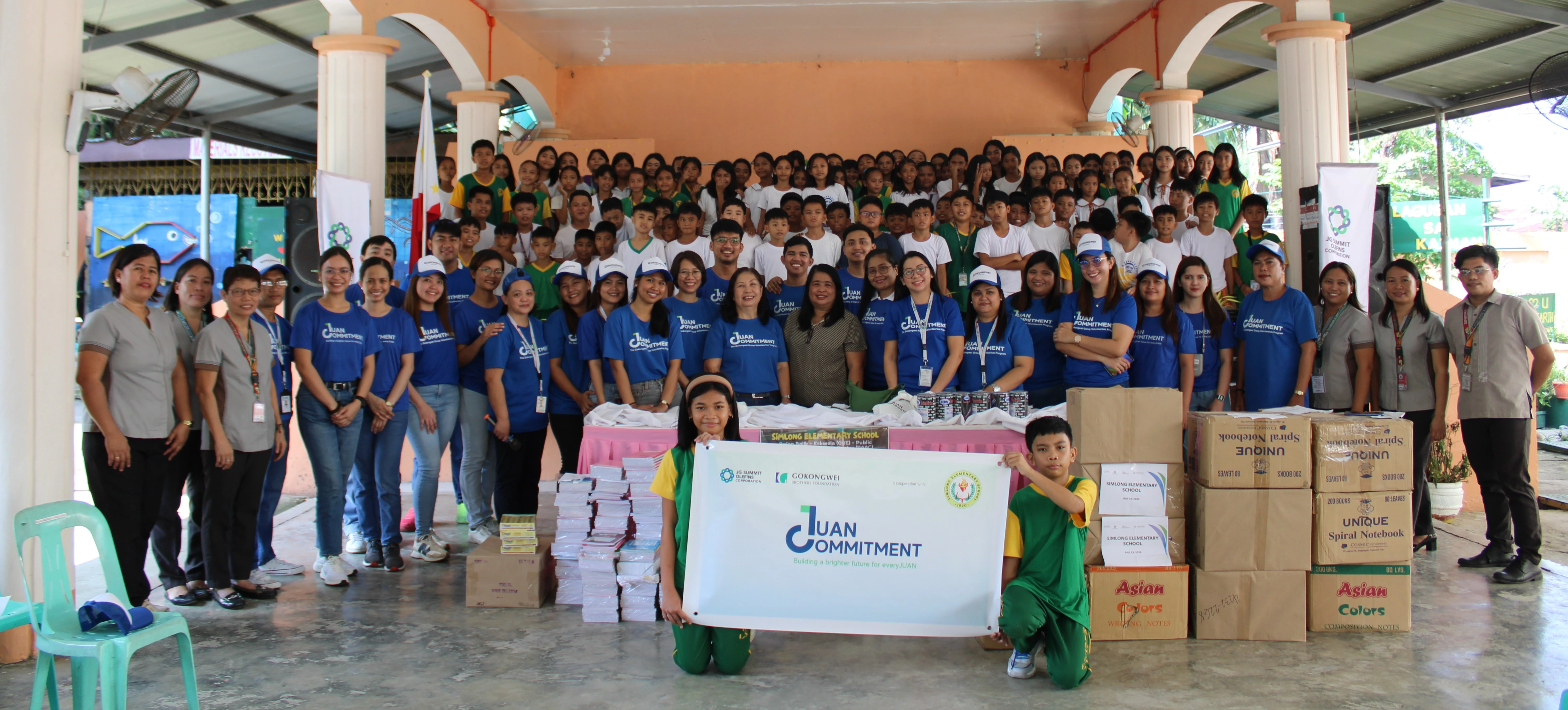
Food Rescue
JGSHI subsidiaries, Universal Robina Corporation (URC) and Robinsons Land Corporation (RLC), together with our affiliate, Robinsons Retail Holdings, Inc. (RRHI), have continued to strengthen their collaboration with Scholars of Sustenance Philippines (SOS PH) by integrating food security into their company-wide sustainability initiatives. The partnership began in December 2022 when the conglomerate recognized the critical role of nutrition in driving a community's progress. This awareness led to the company redirecting their surplus edible food to those in need, supporting efforts to achieve Zero Hunger.
Scholars of Sustenance (SOS), a registered non-profit organization, works to address food waste and insecurity across Southeast Asia. Operating in Thailand, Indonesia, and the Philippines, SOS partners with restaurants, food manufacturers, hotels, and retailers to recover excess high-quality food and distribute it to vulnerable communities. In the Philippines, SOS PH has been instrumental in rescuing and redistributing food to underserved communities, significantly reducing food waste and enhancing food security.
In 2024, JGSHI’s business units have donated nearly 118,369 kg of food, providing approximately 497,148 meals while preventing around 299,472 kg of CO2 emissions by diverting food from landfills—almost tripling the previous year’s contributions. This remarkable achievement underscores the effectiveness of the partnership and the commitment of JGSHI and its subsidiaries to sustainability and community support.
Looking ahead, JGSHI aims to further expand its collaboration with SOS PH by incorporating more entities into its food rescue initiatives, reinforcing its long-term commitment to enhancing food security in the country. By scaling up these initiatives, the conglomerate aims to maximize food redistribution, reduce waste, and provide greater support to underserved communities. This expansion underscores JGSHI’s enduring dedication to promoting food security and sustainability across the nation.
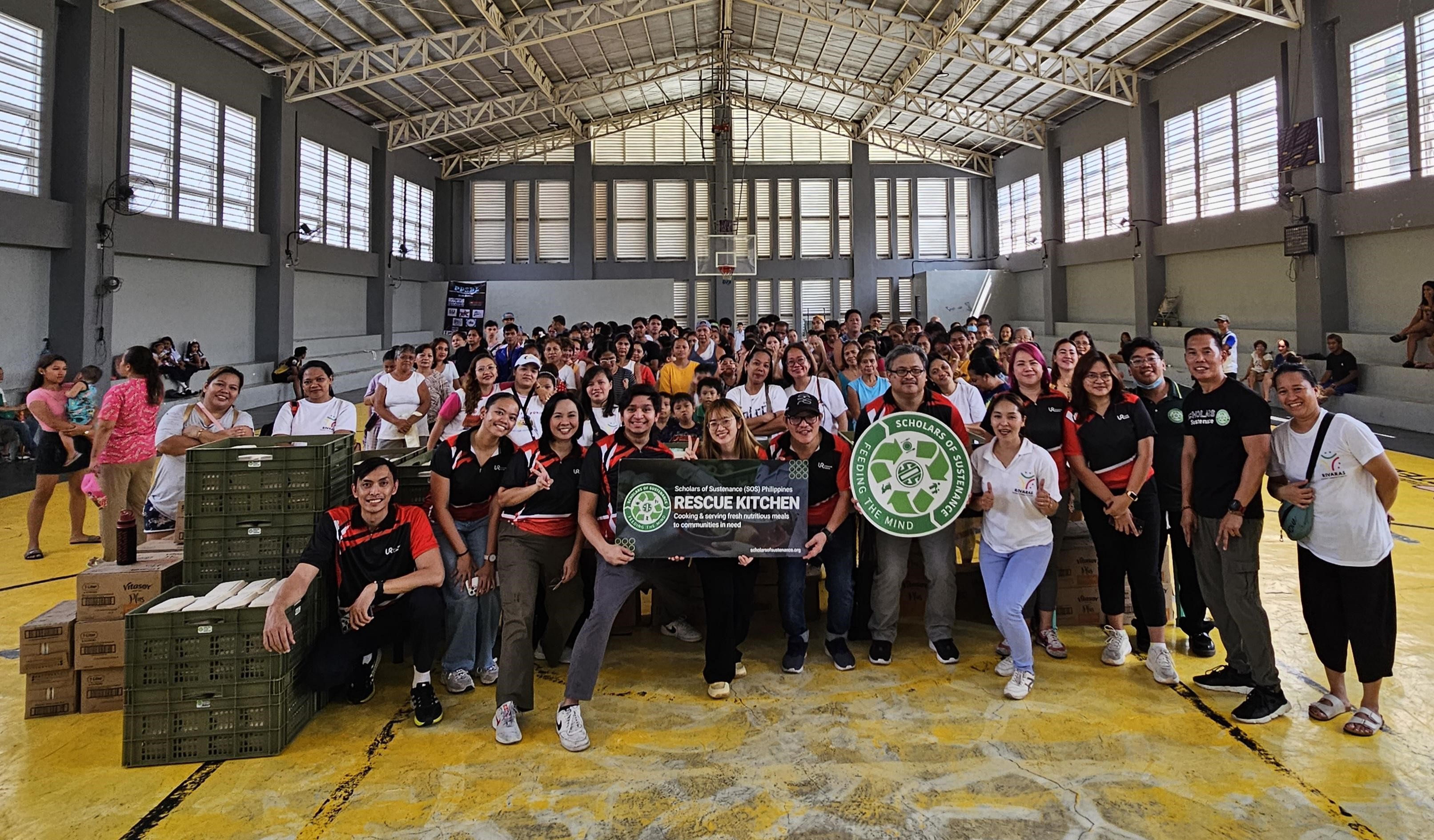
JGSOC Family PatikaRun
JGSOC Family PatikaRun brought together employees, their families, and the broader Batangas community for a meaningful cause. More than just a fun run, the event served as a fundraising initiative to support the Abot Kamay program, JGSOC’s flagship corporate social responsibility (CSR) initiative focused on education and community development.
JGSOC’s commitment to sustainability extends beyond environmental efforts—it also encompasses social responsibility. The Family PatikaRun was designed to generate funds for Abot Kamay, reinforcing the company’s dedication to uplifting local communities through education-focused projects. The event also aimed to promote health and wellness among participants while fostering a sense of unity and camaraderie.
Held at the Provincial Capitol Site in Batangas City, the event was open to JGSOC employees, their families, and members of the local community.
The day started with an energetic Zumba session to warm up participants, followed by the fun run itself, which encouraged runners of all ages to participate at their own pace. The event culminated in a Palarong Pinoy, a traditional Filipino game segment that added a cultural and nostalgic touch to the festivities. To recognize outstanding performance, the top three finishers among JGSOC employees were awarded medals and cash prizes.
Through the collective efforts of participants, sponsors, and the JGSOC community, the Family PatikaRun successfully raised PHP 244,150. These funds were allocated to the Abot Kamay initiative, furthering the company’s mission to provide educational support and resources to underserved communities and its dedication to meaningful initiatives that empower lives and create lasting change.
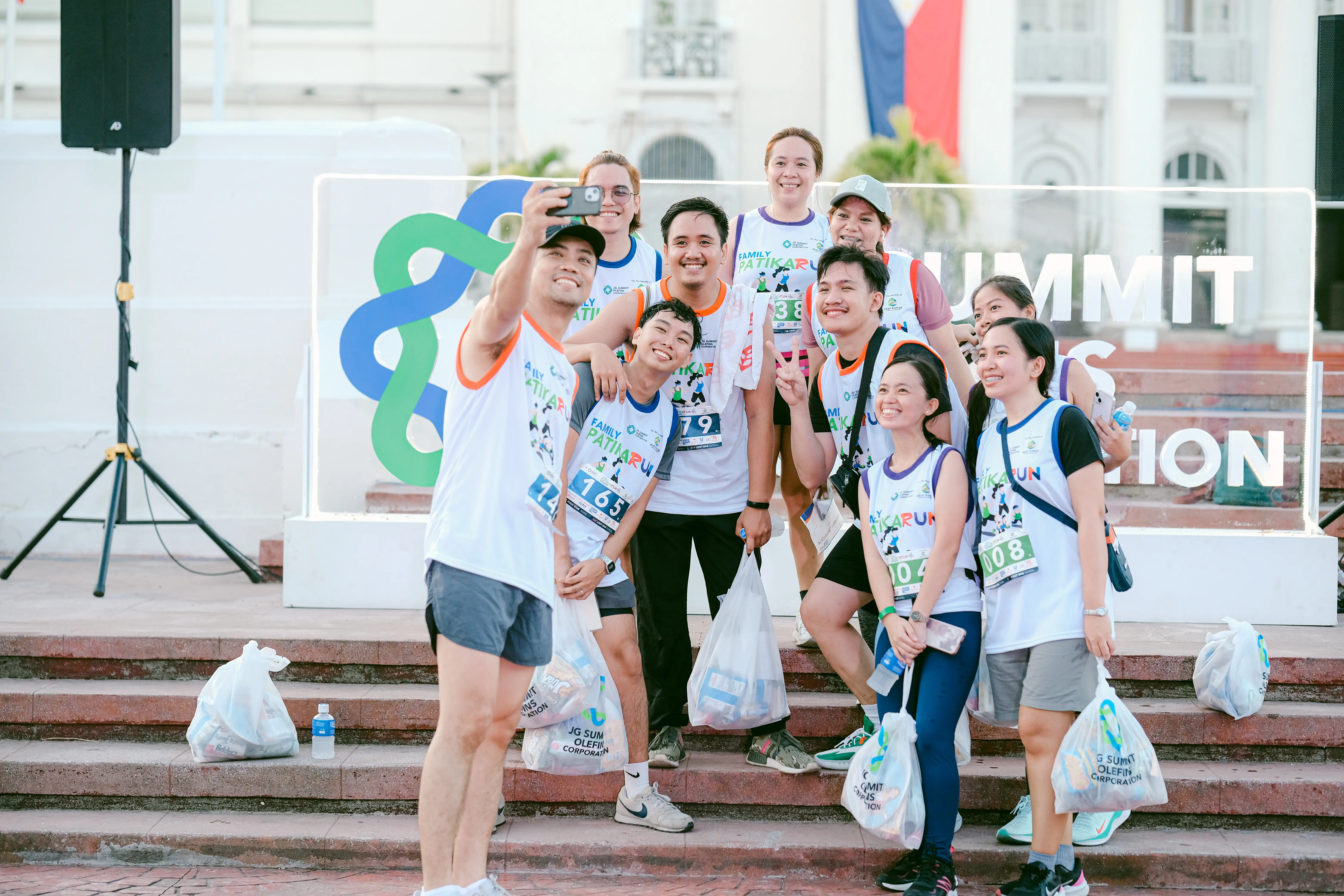
JGSOC’s Sustaining Livelihoods
JGSOC, in partnership with the Department of Agriculture – Bureau of Fisheries and Aquatic Resources (BFAR), launched a community-based training program titled Sustaining Livelihoods: Transforming Fish Byproducts into Valuable Community Assets. This initiative aimed to enhance the skills of fisherfolk and fish vendors in Batangas City by equipping them with knowledge on fish preservation techniques and value-added processing.
Aligned with JGSOC’s Abot Kamay program, this initiative sought to support sustainable community development by fostering livelihood opportunities. The training focused on teaching participants traditional and modern fish preservation methods, such as making bagoong (shrimp paste) and preparing dried squid. These skills not only help maximize the value of fish byproducts but also promote sustainable fishing practices that reduce waste and improve economic resilience among local fisherfolk.
The training brought together 89 fisherfolk and fish vendors from Barangay Simlong, Pinamucan Proper, and Pinamucan Ibaba. By partnering with BFAR, JGSOC ensured that participants received expert guidance on best practices in fish processing, hygiene, and market potential. The program also highlighted environmentally friendly techniques that align with sustainable resource management, helping the community adopt responsible fishing practices.
During the training sessions, participants engaged in practical, hands-on demonstrations to refine their skills in fish drying and fermentation. They learned how to optimize the quality of their products, enhance food safety, and explore new market opportunities. These workshops encouraged innovation while preserving traditional knowledge, bridging the gap between heritage and modern business practices.
The Sustaining Livelihoods training program is part of JGSOC’s commitment to strengthening its host communities by providing sustainable economic opportunities. By equipping local fisherfolk with essential skills and knowledge, JGSOC and BFAR aim to improve the economic well-being of Batangas’ coastal communities while promoting responsible fishing and waste reduction practices.
Future plans for the program may include expanding training modules to cover additional fish byproduct innovations and exploring market linkages to help participants commercialize their products. Through continued collaboration with industry experts and local stakeholders, JGSOC aims to foster self-sufficient and environmentally conscious communities in Batangas City.
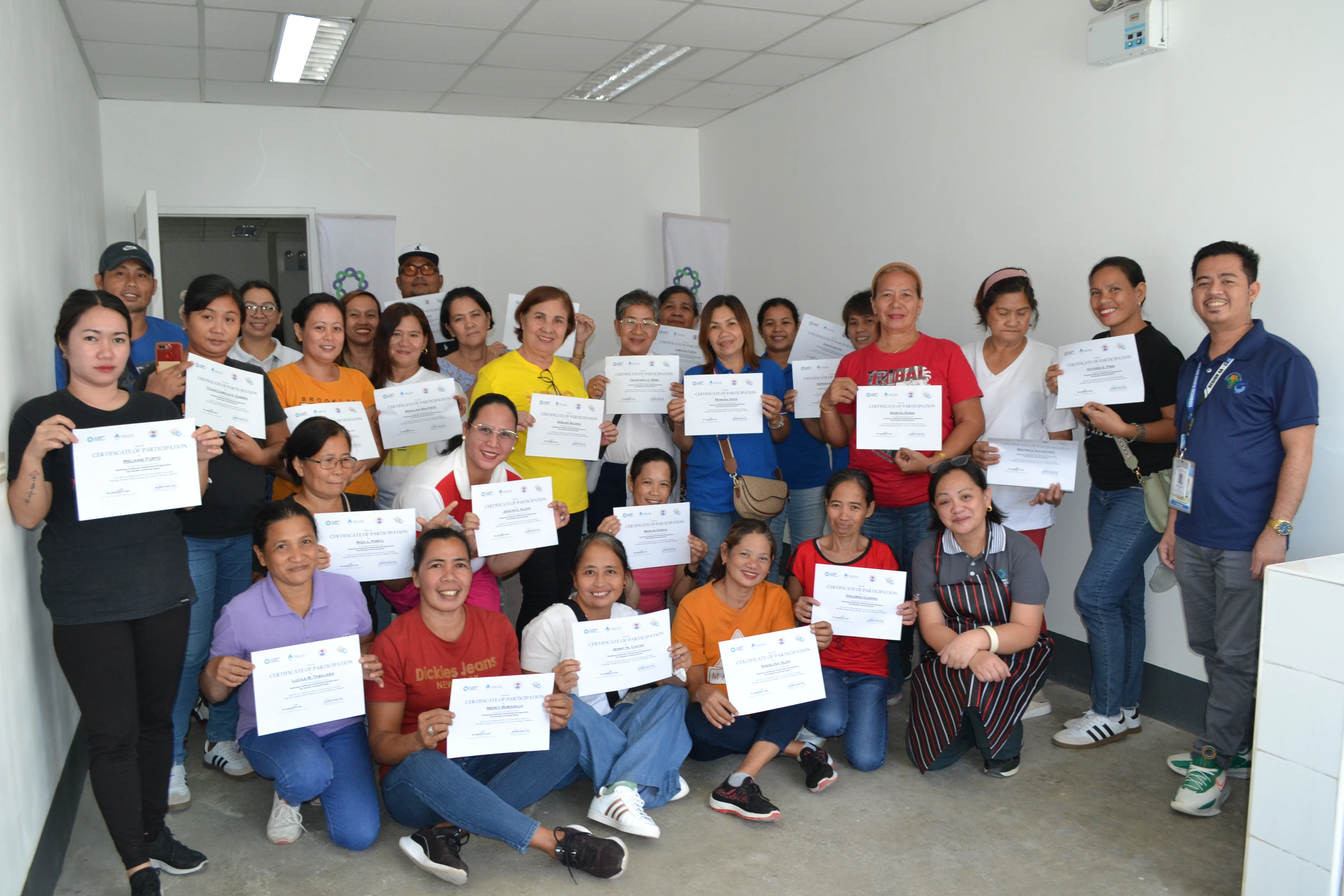
URC’s Sustainable Procurement
Since 2022, the sustainable procurement program was launched to promote responsible sourcing of raw and packaging materials, demonstrate environmental stewardship, and enable sustainable development of communities where the company operates to revolutionize and lead the transformation towards the sustainable supply chain through the integration of seven core subjects: organizational governance, human rights, labor practices, environment, fair operating practices, consumer issues and community involvement in developing a holistic procurement and sourcing strategy.
Responsible sourcing: 60% of the palm olein procured and used by the company in its operations in 2024 was RSPO Certified, ensuring the implementation of the highest standards and industry practices in the sourcing of palm olein and its derivatives. Also, 100% of the company’s chipping potatoes were sourced from GAP-certified suppliers. The AIG business unit has been continuously using soybeans with the Sustainable US Soy Seal, receiving recognition from the US Soybean Export Council as the first company to use this in Southeast Asia in 2022.
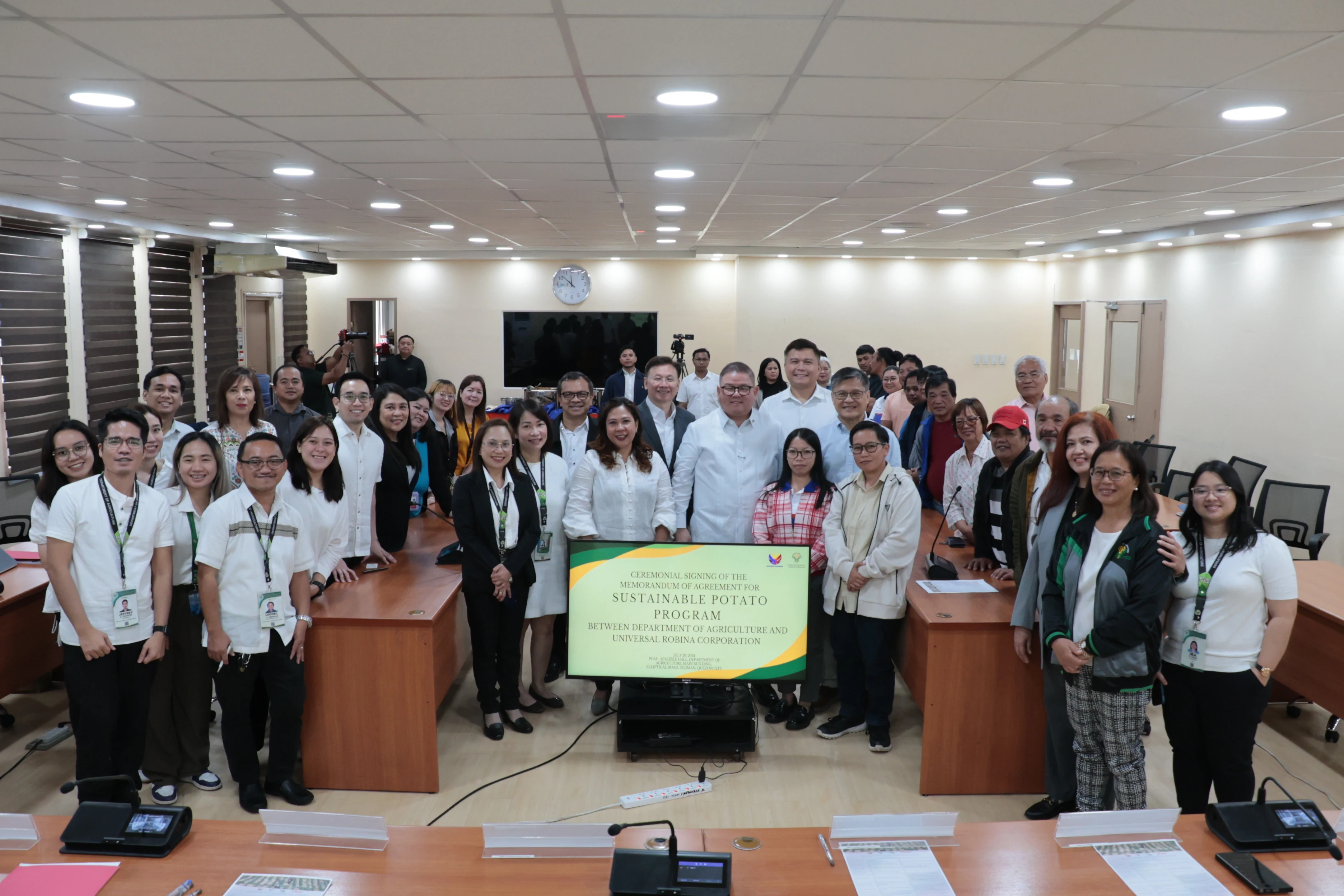

Universal Robina Corporation
- 50 volunteers from CEB and Avolon
- Renovated community center
- Daraga
- Zamboanga
- Dumaguete
- Gensan
- Cebu
- Tawi-Tawi
- Puerto Princesa

Universal Robina Corporation
- 60% of the palm olein procured and used by URC is RSPO Certified
- 100% of chipping potatoes used is GAP Certified
- First to receive the Sustainable US Soy Seal from the US Sobean Export Council in Southeast Asia

Universal Robina Corporation
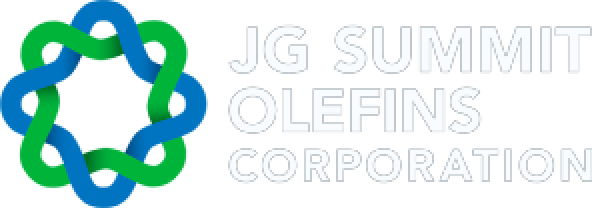
Universal Robina Corporation

Universal Robina Corporation
- Total of 6,192 hours of volunteer time was accrued which led to procurement of PHP 2,000,000 contributions and PHP 807,934 in-kind donations from various SBUs
- Impacted 200,000 individuals (students, educators, and parents) from community efforts

Better Choices
Better Choices represents our unwavering commitment to innovation and accessibility. This initiative is not a one-time effort but a continuous journey towards improving our offerings and achieving meaningful breakthroughs that enhance lives. By consistently innovating, we empower our customers with products and services that are better options.
Our dedication to Better Choices means providing healthier food, developing greener buildings, offering affordable and accessible flight options, and creating innovative petrochemical products. Each of these efforts is designed to make a positive impact to our valued customers.
For URC (updated target), by 2023
- Healthier food;
- Total URC Wellness Score for 2024 using updated criteria showed 87% passed three URC Wellness Criteria
For RLC
- Greener buildings;
- Six additional office buildings certified, two residential buildings certified
For CEB
- Affordable and accessible flight options; and
- 24.5 million passengers;
- 123 routes (84 Domestic, 39 International);
- 63 destinations (38 Domestic, 25 International);
- 29 million seat capacity
For JGSOC
- Innovative petrochemical products
- JGSOC’s premium polypropylene resins—EVALENE PLUS® PRJ1102 and EVALENE PLUS® PRJ3501—utilizing the clarifying additive Millad® NX® 8000 made by Milliken & Company—received a UL Environmental Claims Validation (ECV) Certification from UL Solutions, a globally recognized safety science company in 2024. This additive and our resins enable an average of 10% energy savings when manufacturing plastic products, showcasing our shared commitment to sustainability
ESG Excellence at Cebu Pacific
2024 was a landmark year for Cebu Pacific (CEB) in sustainability, marked by unprecedented achievements. The airline received its best-ever ESG ratings from two of the most respected independent third-party raters, MSCI and S&P Global.
An ESG Score evaluates how well a company manages the environmental, social, and governance (ESG) dimensions of sustainability. It offers a quantitative assessment of a company’s performance in managing sustainability-related risks and opportunities, enabling comparisons with industry peers.
CEB’s Sustainability Strategy spans three ESG pillars:
- Caring for Juan Planet: Focuses on reducing environmental impact and encouraging stakeholders to do the same
- Growing as Juan Family: Prioritizes employee well-being, customer experience, and community engagement
- Building Juan Community: Promotes effective and responsible governance to support sustainable growth
CEB has shown consistent progress across these pillars. In July 2024, MSCI upgraded CEB’s ESG rating to AA, a distinction no other local airline has achieved, and placed CEB among the top-rated carriers worldwide.
CEB has made notable strides in reducing its environmental impact, ranking in the top quartile among its peers for carbon emissions management. CEB has effectively improved fuel efficiency and reduced carbon emissions with its modern fleet of next-generation aircraft.
In addition, CEB has excelled in social performance metrics through robust data privacy measures and improved labor management practices. The airline consistently ranks highly in these areas, driven by strong employee engagement programs and a commitment to international safety standards, including the IATA Operational Safety Audit (IOSA).
On the governance front, CEB has earned recognition for its strong anti-bribery and anti-corruption policies and its comprehensive governance frameworks that uphold ethical and responsible business practices. These initiatives demonstrate the airline’s unwavering commitment to strong corporate governance.
CEB also received high marks for cybersecurity, with stringent data protection protocols and advanced security systems to safeguard digital assets and customer information.
In December 2024, S&P Global upgraded CEB’s ESG score to 46, marking the airline's largest gain since 2021. The five-point increase, from 41 in 2023 to 46 in 2024, represents the most significant improvement in years.
The 2024 score places CEB in the top 25% of the airline industry. CEB outperformed the industry average across all three ESG dimensions, with the most notable improvement in the environmental dimension, which saw a remarkable 20-point increase. CEB remains strongest in the social dimension, scoring 51, well above the industry average of 33. Additionally, CEB made strides in governance and economic dimensions, each showing a three-point increase.
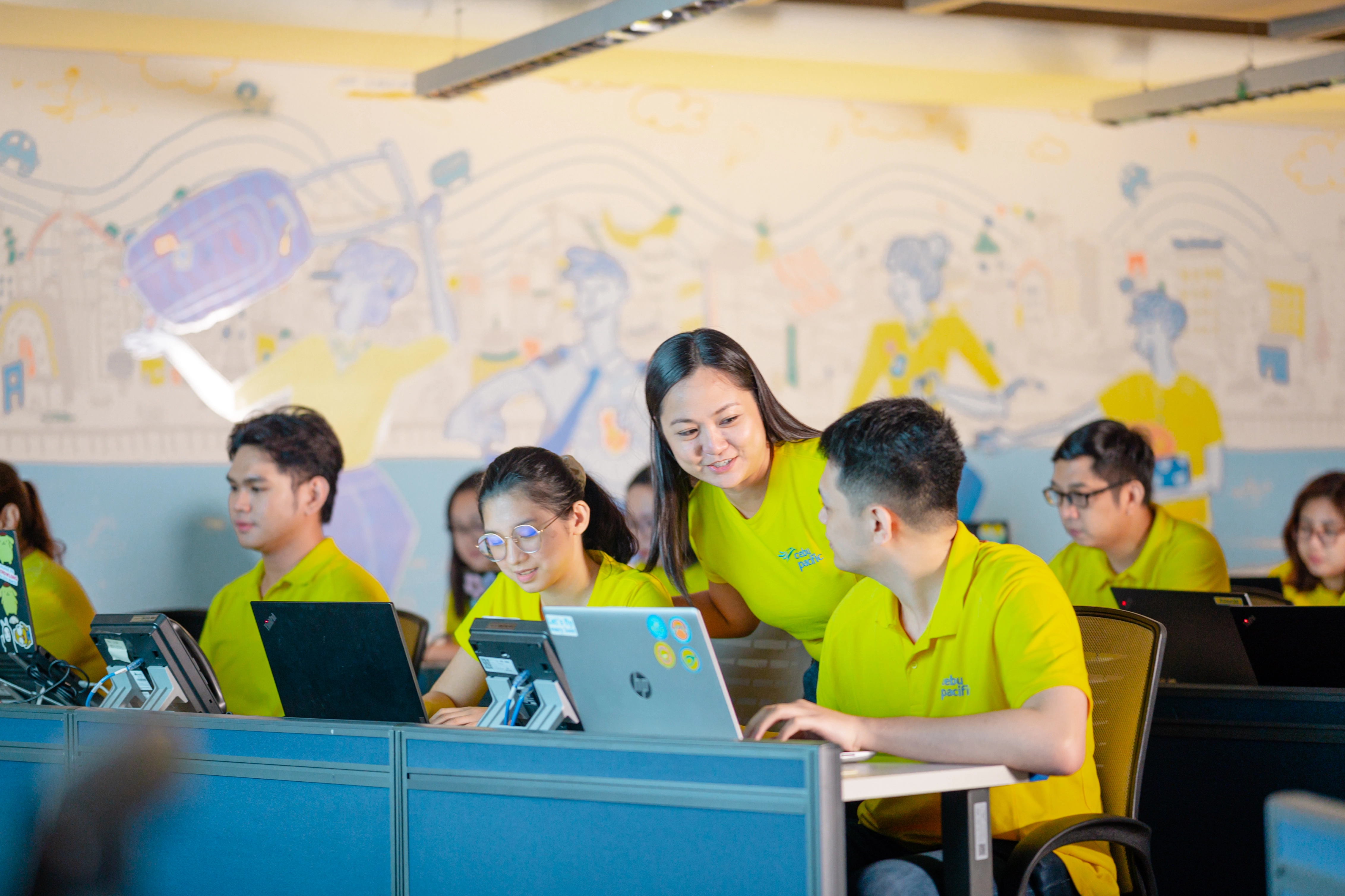
Building Juan Community - Strengthening Trust Through Governance and Security
CEB remains committed to strong governance, cybersecurity, risk management, and crisis preparedness—safeguarding operations and ensuring stakeholder trust.
With rising cyber threats, CEB has strengthened its defenses through the 2024 Cybersecurity Awareness Program. Employees serve as human firewalls, enhancing security through improved compliance rates: Security Awareness Proficiency Assessment (SAPA) completion rose to 96% from 89% in 2023, and awareness training reached 97%, up from 78%. A phishing test showed a low 6% phish-prone rate, underscoring employee vigilance. The program includes SAPA assessments, targeted training, phishing simulations, and remedial courses for at-risk employees.
CEB also conducted a Cyber Risk Assessment to evaluate its security posture. A third-party review found 90% of security controls compliant, with 10% marked for improvement. This structured approach involved security analysis, risk evaluation, and strategic recommendations for enhanced protection. CEB is also registered with the National Privacy Commission through the Data Protection Officers and Data Processing Systems Seal of Registration. This demonstrates compliance with data privacy and protection regulations, signifying its commitment to safeguarding personal data.
Beyond cybersecurity, CEB prioritizes business resilience. In October 2024, the airline introduced the Disruption Management Team (DMT) to swiftly address short-term operational disruptions. In addition, a Business Continuity Plan (BCP) exercise tested headquarters transition protocols, ensuring operational continuity. Annual emergency response training with GoCrisis further reinforced crisis preparedness.
CEB also launched the Enterprise Risk Management P.R.I.M.E. Roadshow to instill a risk-aware culture. Through interactive workshops, employees improved risk identification and mitigation, supported by standardized risk registers and continuous learning sessions. This initiative enhanced decision-making and organizational resilience.
CEB earned the prestigious three Golden Arrows award from the Institute of Corporate Directors, recognizing its transparency, shareholder protection, and ethical leadership. This achievement reflects CEB’s dedication to corporate excellence and sustainable growth.
By continuously advancing cybersecurity, risk management, and resilience, CEB fortifies its operations and sets a benchmark for governance excellence, ensuring long-term success and stakeholder confidence.
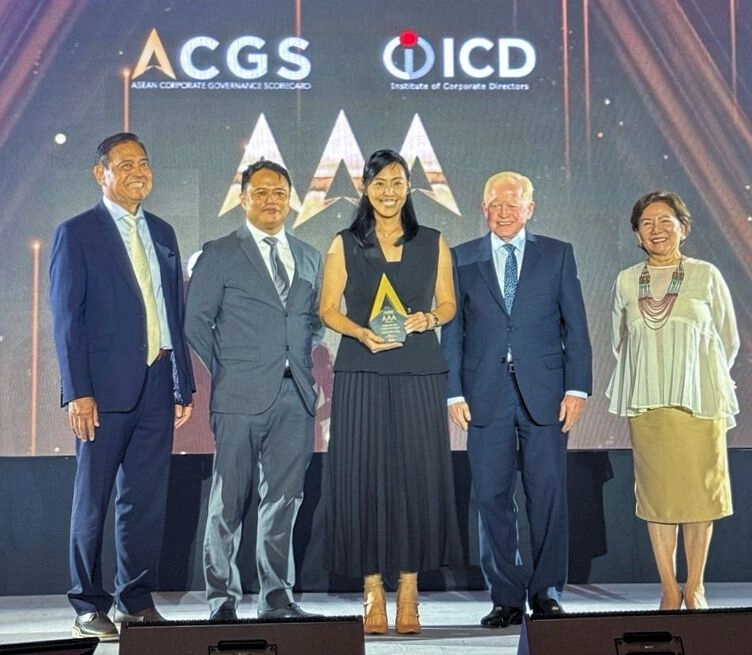
RLC’s Immersive Experiences: Transforming Malls into Ultimate Family Destinations
Robinsons Malls redefined family entertainment by pioneering three groundbreaking themed experiences that captivated audiences and delivered tangible business results. These attractions were not merely crowd-pullers; they became widely discussed experiences that strengthened Robinsons Malls’ reputation as a premier destination for unique, interactive, and shareable moments.
In September 2023, Robinsons Galleria Cebu, in partnership with Live House Production, unveiled Dinosaurs Alive, a first-of-its-kind immersive attraction that transported visitors back to the Jurassic era. Featuring lifelike animatronic dinosaurs that moved and roared, the exhibit created thrilling encounters for children while evoking nostalgia among parents, making it a must-visit family destination. The overwhelming success of Dinosaurs Alive reinforced Robinsons Malls’ ability to curate engaging, family-friendly experiences that increased foot traffic and extended visitor dwell time.
Wintermagic transformed Robinsons Galleria Ortigas and Robinsons General Trias into an enchanting winter wonderland, offering shoppers an immersive holiday experience. This captivating spectacle not only entertained visitors but also fostered family bonding, generated significant social media engagement, and reinforced Robinsons Malls’ reputation as a leader in experiential retail.
Building on the viral success of the Young-hee Doll’s 2021 debut, Robinsons Galleria once again became the focal point of Squid Game excitement through an exclusive collaboration with Netflix. Featuring large-scale installations of the show’s iconic stairs and the striking presence of pink-clad guards, the activation recreated the series’ suspenseful atmosphere. Enthusiastic fans flocked to Robinsons Malls, demonstrating the powerful influence of pop culture-driven experiences.
These themed attractions extended beyond entertainment, solidifying Robinsons Malls as a premier family destination. These attractions redefined the traditional mall visit, offering families interactive and educational experiences while benefiting mall tenants through increased foot traffic and prolonged customer engagement. As Robinsons Malls continued to innovate, it remained committed to transforming the shopping experience, ensuring it remained a vibrant destination where memorable moments came to life.
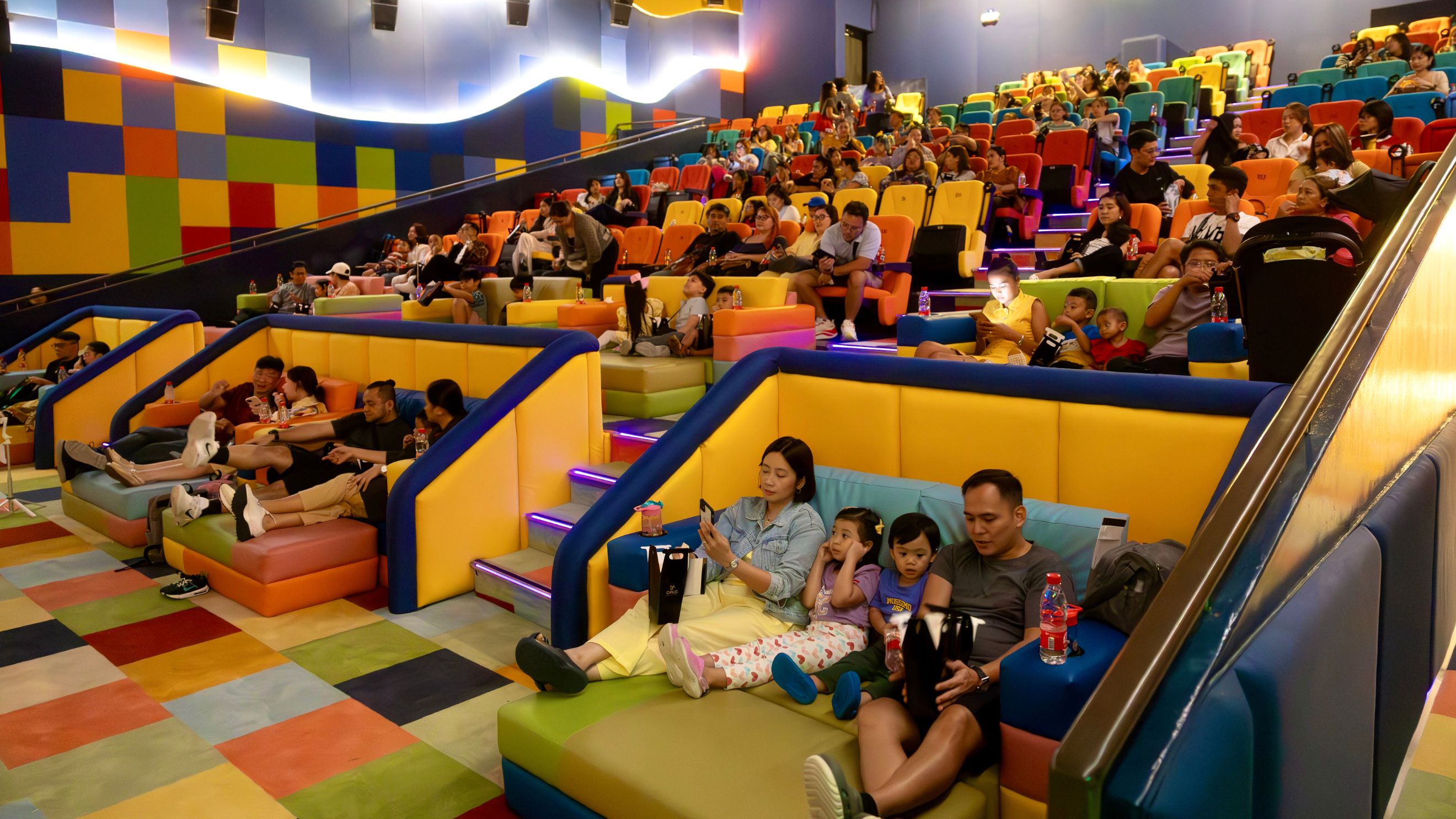
Robinsons Malls—A Mall for All: Creating Inclusive and Empowered Communities
Robinsons Malls remained steadfast in its commitment to being Our Favorite Place by fostering an inclusive, safe, and empowering environment for all. In 2024, the company intensified its focus on three key areas: inclusivity, livelihood support, and women empowerment, reinforcing its role as a socially responsible retail leader. A major initiative was the establishment of Safe Zones for persons with disabilities (PWDs), senior citizens, and pregnant women, ensuring accessibility and comfort during large events. In collaboration with Mall Operations, Marketing, and Security teams, Robinsons Malls implemented security and accessibility training, enabling seamless event experiences for these groups. The partnership with organizations like Banana Peel and Best Buddies Philippines further underscored this commitment through Slide Together, Embrace Inclusion, an event that promoted inclusivity and raised funds for individuals with intellectual and developmental disabilities.
Beyond accessibility, Robinsons Malls championed livelihood support through BJMP Trade Fairs, providing Persons Deprived of Liberty (PDLs) with opportunities to sell handmade crafts. In collaboration with local governments and the Bureau of Jail Management and Penology (BJMP), these fairs, hosted in eight malls, benefited over 2,200 PDLs and generated sales income for their families. Robinsons Malls demonstrated a commitment to uplifting marginalized communities while promoting socially responsible consumerism by offering a platform for rehabilitation and financial support.
Women empowerment also took center stage, with Robinsons Malls partnering with World Vision and the Antipolo Local Confederation of Women to celebrate Women's Month through financial literacy, skill-building, and self-defense programs. The initiative equipped over 300 participants with practical knowledge and skills, fostering economic independence and personal growth. The #GIRLSCAN campaign further amplified these efforts by inspiring and empowering women and children, reinforcing Robinsons Malls' role in nation-building.
These initiatives exemplified Robinsons Malls’ dedication to stakeholder engagement by addressing diverse community needs. The Safe Zones initiative, for example, ensured inclusivity at major events, with nearly 10% of attendees coming from special needs groups.
Similarly, the BJMP Trade Fairs distinguished Robinsons Malls from competitors by transforming shopping spaces into platforms for social good, fostering rehabilitation, and creating responsible shopping opportunities. Meanwhile, the Women Empowerment initiative strengthened the mall’s commitment to fostering self-sufficiency and resilience among women.
Through these strategic and impactful initiatives, Robinsons Malls redefined the role of shopping centers as inclusive and socially responsible community hubs. By integrating accessibility, livelihood opportunities, and women empowerment into its core operations, Robinsons Malls strengthened its brand image, enhanced customer engagement, and solidified its position as a retail leader committed to meaningful and sustainable community development.
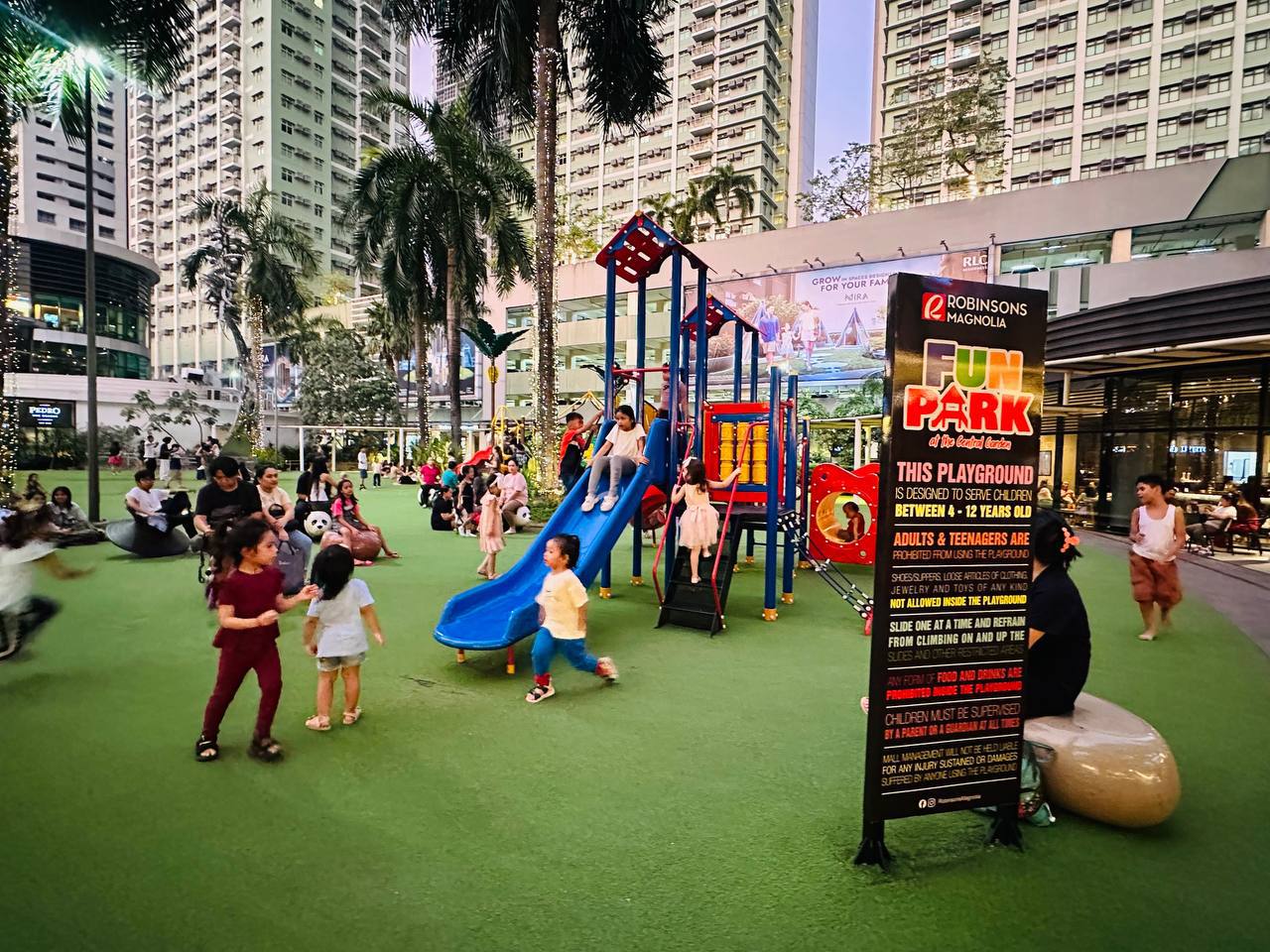
Robinsons Malls Champions Active Lifestyle
Robinsons Malls has redefined the traditional mall experience by transforming underutilized spaces into dynamic community hubs that promote sports, wellness, and social engagement. This initiative fosters healthier lifestyles and strengthens community involvement, positioning Robinsons Malls as a leader in innovative and sustainable urban spaces.
A key component of this transformation is repurposing mall spaces to accommodate sports and recreational activities. Previously underutilized areas have been converted into pickleball and table tennis courts, providing accessible venues for casual play and competitive matches. These spaces have become focal points for skill-building, social interaction, and overall well-being.
Additionally, Robinsons Malls introduced the RKids Push Bike Racing Series in collaboration with the National Bicycle Organization, encouraging children to engage in cycling through structured and interactive activities. The initiative includes a Push Bike Racing Passport and Push Bike Lab, designed to make cycling more engaging for young riders and their families. Further supporting active lifestyles, the RMalls Academy Summer Clinics offer dedicated spaces for structured sports training, reinforcing camaraderie, skill development, and physical activity within the community.
These efforts have received widespread recognition and acclaim. Robinsons GenSan was commended by the Sangguniang Panlungsod for introducing pickleball to the local community, fostering health, wellness, and family bonding. The initiative also gained praise from the GenSan Pickleball Group, leading to the growth of a thriving pickleball community. Furthermore, Robinsons Malls was honored as the Sports Tourism Mall Sports Venue of the Year at the 6th Sports Tourism Awards and successfully hosted the 2024 SOCCSKSARGEN Regional Athletic Association’s table tennis and arnis competitions, earning commendations from local government bodies. These initiatives have also empowered young athletes, producing multiple champions and bringing pride to schools and cities such as Bacolod and Tagum, further solidifying Robinsons Malls as a hub for athletic excellence.
The transformation of spaces into sports hubs reflects a commitment to embracing emerging trends while fostering community engagement. Unlike traditional retail spaces, these interactive environments increase foot traffic, enhance customer satisfaction, and contribute to local sports development. Strategic partnerships with the National Bicycle Organization, local government units (LGUs), and community groups ensure the initiative’s long-term impact and sustainability.
The measurable impact of these initiatives is significant. Nationwide, Robinsons Malls has introduced 12 pickleball courts and 15 table tennis courts, attracting 50–80 players per session and fostering a growing sports community. The Push Bike Racing Series has expanded from eight (8) races to 22 by 2024, with nearly 70 events held, engaging over 2,500 young participants and 11,500 family members. The RMalls Academy now hosts 88 monthly classes, with over 2,000 participants joining activities such as chess, badminton, karate, taekwondo, and jiu-jitsu.
Robinsons Malls has reimagined the mall as more than a shopping destination—it is now a thriving space for health, wellness, and social connection. Merging sports, recreation, and retail has created an environment where families bond, athletes grow, and communities come together. This transformation elevates the mall experience and inspires a new way of living—one that prioritizes active lifestyles, well-being, and sustainability. As Robinsons Malls continues to evolve, it remains committed to fostering spaces where individuals can thrive, proving that malls can be powerful catalysts for positive change.
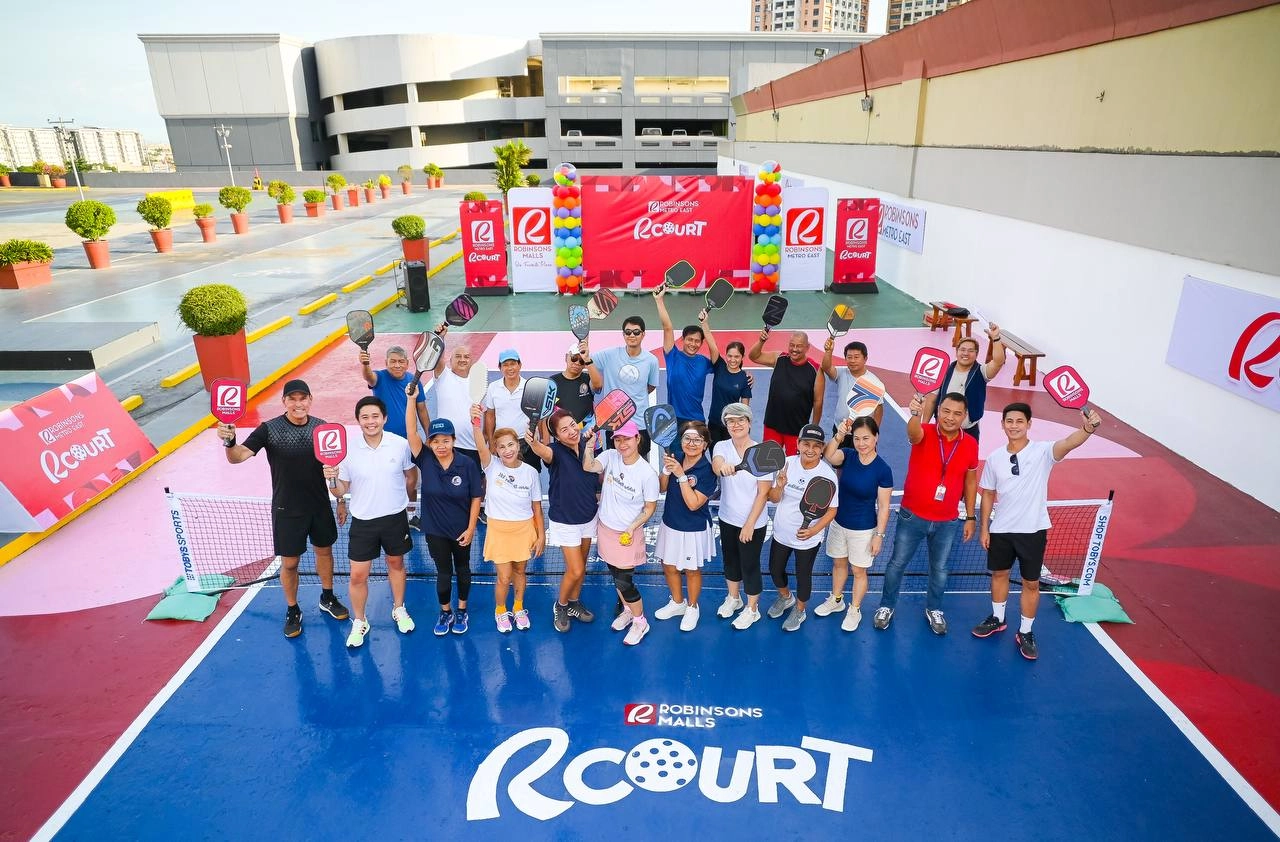
JGSOC Leads the Way in Preparing a Healthy Baon with Sunnyware®
JGSOC, in collaboration with Sunnyware® and Lions Club, embarked on an educational school tour titled “Preparing A Healthy Baon with Sunnyware®.” This initiative aimed to teach parents, students, and teachers about the importance of preparing healthy and affordable packed meals while promoting sustainable food storage solutions.
The program emphasized the value of balanced and nutritious meals for students, addressing concerns about both health and affordability. A key segment of the event focused on educating participants on the safety of high-quality, reusable plastic products for food storage, contributing to everyday convenience while also supporting sustainability. The program further highlighted the role of proper solid waste management in protecting the environment, reinforcing the initiative’s alignment with JGSOC’s broader sustainability commitments.
During the three-day tour, the team visited Antonio Uy Tan Senior High School and Urduja Elementary School in Caloocan City, Centex Elementary School in Manila, and Acacia Elementary School in Malabon City. These visits provided an interactive platform where parents, students, and teachers learned firsthand about the benefits of reusable plastics in food preparation. Sunnyware® showcased its durable, BPA-free bento boxes and tumblers, which were also given away to attendees as part of the educational outreach.
JGSOC plays a crucial role in producing the resins used for Sunnyware®’s food storage solutions. Notably, in July, Sunnyware®’s products earned a UL Environmental Claims Validation (ECV) Certification from UL Solutions, a globally recognized safety science company. These products are manufactured using JGSOC’s UL ECV-certified premium polypropylene resins—EVALENE PLUS® PRJ1102 and EVALENE PLUS® PRJ3501—enhanced with Millad® NX® 8000, an additive from Milliken & Company. This innovation not only ensures product safety but also enables an average of 10% energy savings in plastic production, reinforcing JGSOC and Sunnyware®’s shared commitment to sustainability.
Through this initiative, parents and students gained valuable insights into the advantages of reusable plasticware in meal preparation, promoting healthier eating habits while reducing environmental impact. The success of “Preparing A Healthy Baon with Sunnyware®” reflects JGSOC’s dedication to sustainability, innovation, and community engagement.
While future plans for the program are still in development, its positive reception suggests potential expansions to reach more schools and communities. With continued collaboration and advocacy, JGSOC and Sunnyware® remain committed to fostering a healthier, more sustainable future for families across the country.


Universal Robina Corporation
- Upsizing MNL, strengthening CEB, CRK, opening new bases – DVO, ILO
- Launch of New Routes: DMK, KHH, CNX, SWL, CTS
- Engagement with ground handlers, cabin crew, and other departments
- Streamlined communication platforms
- Deeper understanding of passenger recovery across the network
- Upskilled Cabin Services Leaders

Universal Robina Corporation
Continues to innovate its products to offer consumers good food choices in the health and wellness space
- 100% of total products passed one (1) URC Wellness Criterion, 99% passed two (2) URC Wellness Criteria, 87% passed three (3) URC Wellness Criteria, 40% passed four (4) URC Wellness Criteria, and 7% passed five (5) Wellness Criteria
- Significant number of products meet most of the Risk Reduction Criteria Thresholds:
- 15% of products fall within the Threshold for Total Fat
- 40% meet the criterion for Less than 6% Added Sugar in Beverages, but less than 10% of total calories
- 99.6% meet the criterion for <230 Calories per serving
- 67% meet the criterion for 1mg Sodium per 1 Kcal Product
- 92% meet the criterion for 0 Trans Fat and 0 Cholesterol
- Continue to innovate its products to offer consumers good food choices in the health and wellness space
- Continue to consider further innovations and renovations that prioritizes its wellness criteria

Universal Robina Corporation
- 12 pickleball courts and 15 table tennis courts that attract 50–80 players per session
- Push Bike Racing Series Expansion of eight (8) races to 22 by 2024, with nearly 70 events held, engaging over 2,500 young participants and 11,500 family members
- The RMalls Academy hosts 88 monthly classes with over 2,000 participants
- Provided a space for health, wellness, and social connection among various communities
- Encourages active lifestyle, environmental sustainability, and overall well-being
- Establishment of Safe Zones for persons with disabilities (PWDs), senior citizens, and pregnant women
- Launched #GIRLSCAN campaign which aims to inspire confidence and economic independence among women and children to celebrate Women’s Month
- Collaborated with LGUs and Bureau of Jail Management and Penology (BJMP) to create Trade Fairs providing Persons Deprived of Liberty (PDLs) with opportunities to sell handmade crafts
- Nearly 10% of event attendees were from special needs groups
- Partnered with BJMP and LGUs to host BJMP Trade Fairs in eight malls
- Benefited over 2,200 Persons Deprived of Liberty (PDLs)
- Empowered 300+ women through financial literacy, skill-building, and self-defense workshops
- Improved customer engagement by integrating community-focused initiatives into mall operations
- Reinforced the mall’s positioning as a community hub promoting inclusivity, empowerment, and economic support
- Differentiated Robinsons Malls from competitors by leveraging mall spaces for social impact
- Cyberscape Delta 2
- Cybergate Iloilo Tower 1
- Cybergate Iloilo Tower 2
- Robinsons Summit Center
- Robinsons Cybergate Bacolod 2
- Robinsons Cybergate Center 1
- Le Pont Residences
- Mantawi Residences

Universal Robina Corporation
- Energy cost savings
- Increased share of polymer and retail products with UL ECV certifications
- Recognition of Sunnyware®’s UL Environmental Claims Validation certification
- Promoted environmental responsibility through solid waste management education
- Distribution of free bento boxes and tumblers to attendees
- Shifted perception toward eco-friendly, reusable food containers by enforcing sustainability practices
- Reinforced JGSOC and Sunnyware®’s commitment to responsible innovation and sustainability

Employee Growth and Well-Being
We are committed to implementing diverse programs and initiatives that cater to the evolving needs of our workforce. These efforts are designed to help employees unlock their full potential, continuously develop their skills, and achieve their career aspirations within a supportive and encouraging environment. From extensive training, mentorship, skills development programs to wellness initiatives that promote physical and mental well-being, we provide the necessary resources to support employees throughout their professional journey.
Ultimately, our dedication to employee growth and well-being is not just an objective—it is a core value that defines our approach to building a positive and thriving workplace. By investing in our people, we aim to create an environment where every individual has the opportunity to reach their highest potential.
JGSHI Learning Festival: Fostering Growth, Innovation & Collaboration
In 2024, the inaugural Learning Festival was held at Opus Mall and served as a catalyst for knowledge-sharing, bringing together employees, industry leaders, and experts to explore ideas that drive long-term business resilience and environmental responsibility. Under the theme “Celebrate Meaningful Breakthroughs,” the event underscored the power of building partnerships, fostering innovation, and promoting sustainable growth across the organization in order to shape a sustainable and future-ready for all.
Various panel discussions and breakout sessions provided a platform for thought leaders to highlight ongoing efforts to embed responsible and innovative practices across the company’s operations. Experts across business units shared actionable strategies aimed at achieving corporate sustainability goals with three key themes: customer experience, sustainability, and digital transformation.
Customer Experience
- Redefining the Banking Experience: Lionel Lacad of GoTyme Bank presented how they are revolutionizing banking.
- Customer-Centric Homeownership: Chad Sotelo of Robinsons Land Corporation (RLC) shared insights on how a customer-focused approach helps fulfill clients’ homeownership dreams.
- Building Trust for Lasting Relationships: Apple Ignacio of Cebu Pacific emphasized the crucial role of customer trust in fostering strong, lasting connections.
- Innovation-Driven Customer Excellence: Elvis Contado Jr. of UNICON highlighted the insurance brokerage firm’s journey toward customer-centric excellence through innovation.
- Transforming Supplier Engagement Through Innovation: Bismarck Orbe of JG Summit and Donna Armas of Aspen Philippines discussed how innovation reshapes supplier engagement and drives industry-wide changes.
Sustainability and Social Impact
- Advancing Circularity: Francis Paul Bayan of Robinsons Retail championed the 3Rs (Reduce, Reuse, Recycle), emphasizing the need for responsible resource management to minimize environmental impact.
- Building Sustainable Supply Chains: Dr. Shirlyn Reyes of Universal Robina Corporation (URC) detailed the company’s sustainability transformation journey, showcasing initiatives that improve efficiency and reduce waste.
- Environmental Awareness & Education: Ralph Joseph Roy of JG Summit Olefins Corporation (JGSOC) underscored the vital role of ecological education in fostering an environmentally conscious workforce.
- Decarbonization Efforts: Ves Yraola of Cebu Pacific outlined the airline’s roadmap toward reducing carbon emissions, aligning with global climate commitments.
- People-First Strategies: Ramon Rivero of Robinsons Land Corporation (RLC) emphasized how sustainability is embedded in workforce development and community engagement.
As for digital transformation and leadership resilience, experts from JG Summit, URC, Data Analytics Ventures, MaxiGroup, Boston Consulting Group, Amazon Web Services Philippines, Summit Media, IDEO, and Microsoft explored how leadership and technology play a transformative role in adaptability and innovation of a business across various industries. Interactive exhibits from various business units were also provided to showcase tangible demonstrations of innovation and advancements across retail, petrochemicals, aviation, and real estate. These exhibits encouraged cross-industry collaboration and inspired employees to integrate sustainable practices into their respective fields. The festival also introduced the Learning Festival App—a gamified platform designed to enhance participation through interactive challenges, networking features, and knowledge-sharing activities. This initiative exemplifies how technology can be harnessed to promote sustainability education and engagement at scale.
The festival concluded with an exciting preview of upcoming initiatives that will further embed sustainability into the company’s DNA, including the 2025 Pride in Performance Awards and the company Olympics—programs designed to sustain the momentum of continuous learning, employee recognition, and collaboration.
As JGSHI continues to advance its sustainability journey, the Learning Festival stands as a testament to its commitment to fostering a culture of innovation, resilience, and sustainability—equipping its people with the skills, knowledge, and mindset needed to build a greener and more prosperous future
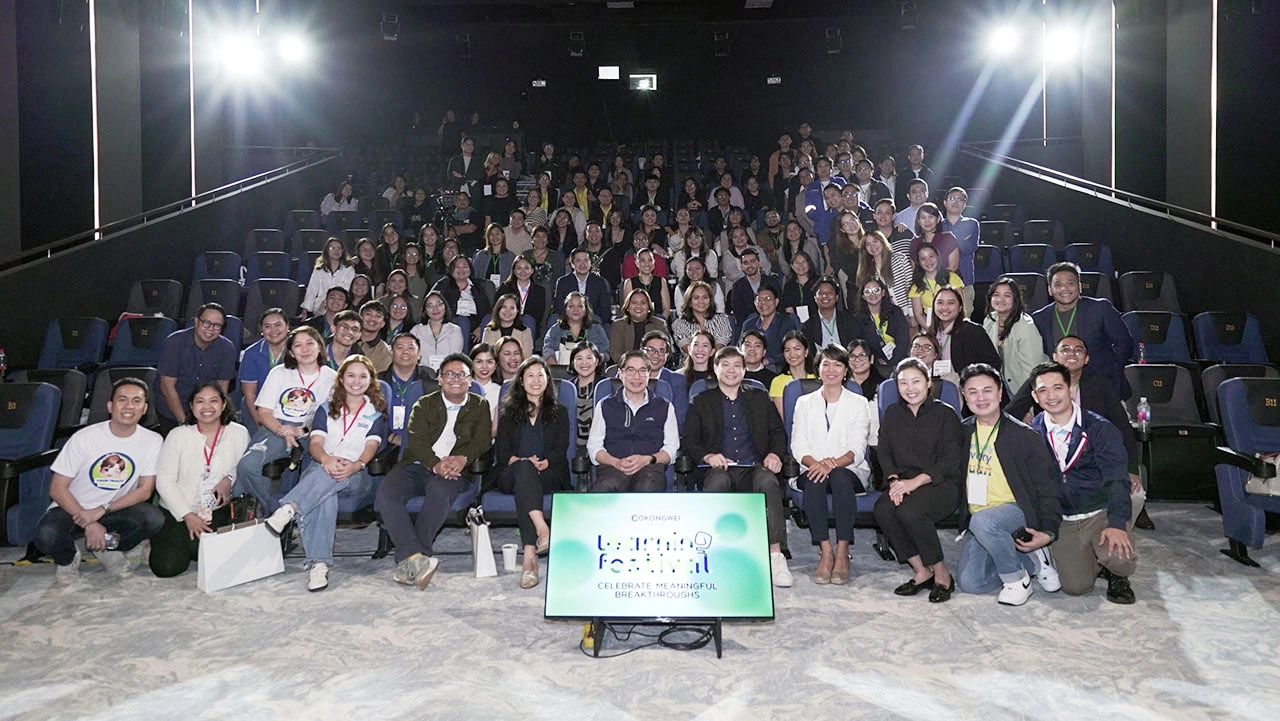
JGSHI’s Comprehensive Employee Wellness Program
In today’s fast-paced corporate environment, employee well-being is essential for maintaining productivity, engagement, and overall job satisfaction. Recognizing the importance of holistic wellness, our organization launched the Comprehensive Employee Wellness Program in 2022. This initiative was designed to address employees’ physical, mental, and emotional health, ensuring they have the resources to lead healthier, more balanced lives.
We developed a structured wellness program with multiple initiatives addressing different aspects of employee well-being. The program includes:
- Physical Wellness Initiatives: Step Challenge, Annual Physical Exam, Onsite Phlebotomy, ECG, and Ultrasound
- Educational & Awareness Initiatives: Monthly Wellness Webinars, Monthly Wellness Posters in Restrooms
- Preventive Healthcare Programs: Vaccination Program, Blood Donation Drives
- Mental Health & Emotional Well-being: Psychological Health and Safety Workshop, Free Mental Health Consultation
- Holistic Wellness & Lifestyle Support: Wellness Bazaar, Free Wellness App
The program is executed through collaborations with trusted healthcare and wellness partners, including Maxicare, Unicon, Aspen, Red Cross, Southstar, MindCare Club, and Rebel. Key activities include:
- Step Challenge (Twice a Year): Employees track steps using the Rebel app, with rewards for top performers
- Monthly Wellness Webinars: Hosted by health and wellness partners covering various topics
- Blood Donation Drives (Twice a Year): Organized in partnership with the Red Cross
- Annual Physical Exams: Conducted onsite for convenient access to health check-ups
- Wellness Bazaar: Featuring vaccination programs, free medicine samples, and mental health resources
- Psychological Health and Safety Workshops: Training focused on stress management and mental resilience
- Rebel Wellness App: Providing fitness tracking, healthy recipes, and mental health resources
- Onsite Phlebotomy, ECG, and Ultrasound Services: Ensuring easy access to diagnostic health care
- Free Initial Mental Health Consultations: Employees can access consultations through MindCare Club
Since the program's launch, there has been a significant increase in employee participation in physical and mental wellness initiatives. Employees are more engaged in health activities, leading to improved morale and productivity. Notable outcomes include:
- Higher participation in step challenges and preventive health measures
- Greater awareness of mental health resources and support systems
- Improved overall employee satisfaction and well-being
- Stronger corporate commitment to sustainability through health-focused initiatives
Building on the program’s success, we plan to:
- Expand wellness webinars to include specialized topics like nutrition and stress management
- Explore partnerships with fitness centers to offer exclusive employee wellness programs
- Enhance mental health support by providing continuous access to resources and consultations
The Comprehensive Employee Wellness Program has transformed the organization’s approach to employee well-being. By integrating holistic health initiatives, the program fosters a healthier, more engaged workforce, ultimately driving productivity and reinforcing our commitment to organizational sustainability. Moving forward, we will continue evolving the program to meet the changing needs of employees, ensuring long-term success and impact.
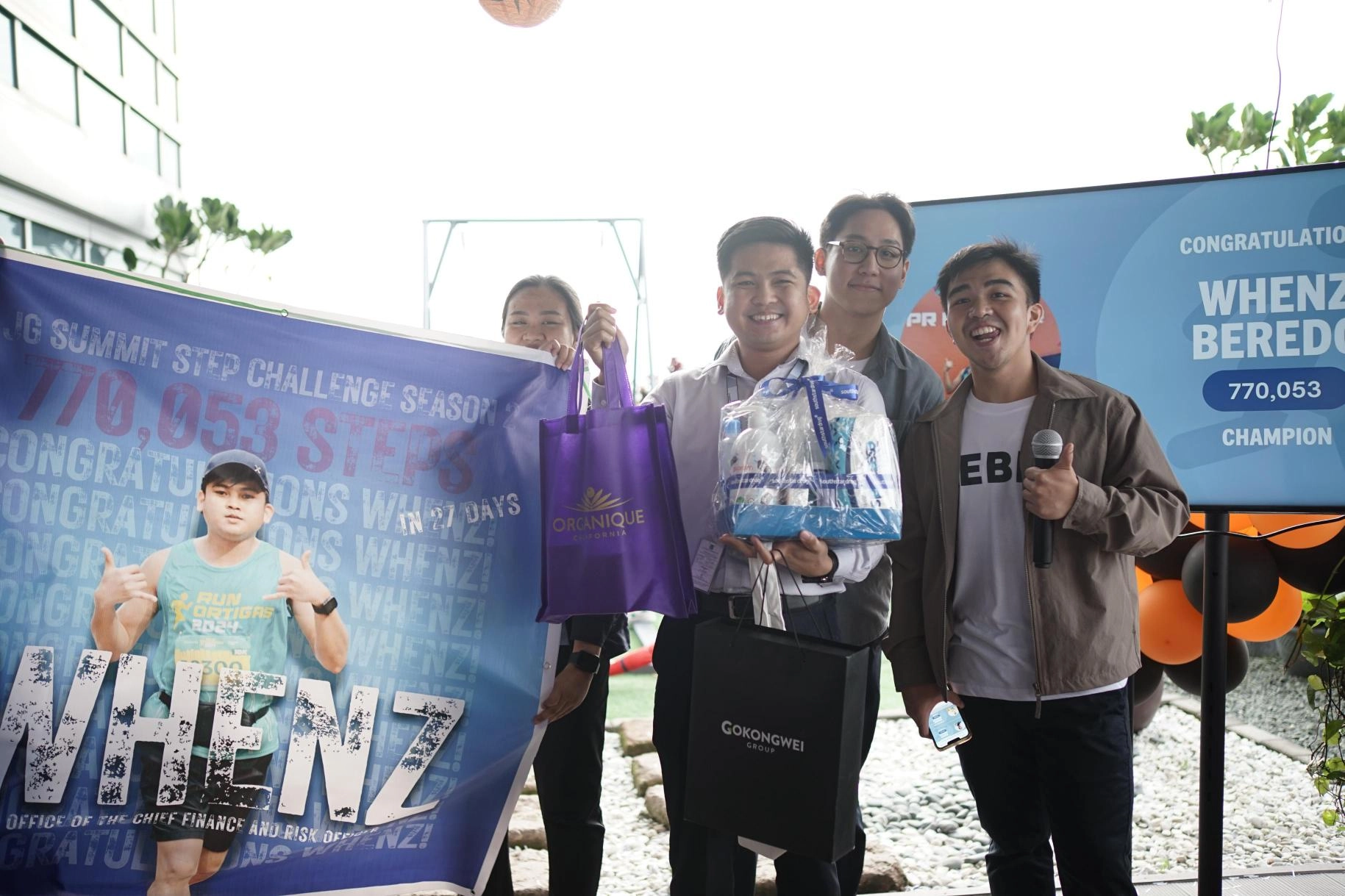
JGSHI Comprehensive Workplace Safety and Preparedness Initiative
A safe and secure workplace is essential for organizational success. Recognizing the importance of emergency preparedness, risk mitigation, and regulatory compliance, JGSHI has implemented a Comprehensive Workplace Safety and Preparedness Initiative. This initiative includes RET Fire Drill Program, GG Project Level Up ISO 45001:2018 Training, Basic Life Support (BLS) Training, GG Occupational Safety and Health (OSH) Council Meetings, GG OSH Convention, OSH Audit for GG Facilities, and Security and Third-Party Services Provider OSH Audit. These programs are designed to enhance emergency response, ensure compliance with occupational safety standards, and cultivate a proactive safety culture across the organization.
Before implementing these initiatives, the company faced several safety challenges. Employees had limited exposure to emergency response training, which led to uncertainty in critical situations. Additionally, there was a need to enhance compliance with occupational safety standards and equip employees with life-saving skills. The initiatives were developed to address these concerns and create a safer workplace in alignment with corporate sustainability goals.
To ensure a well-rounded approach, our organization implemented the following key initiatives:
- RET Fire Drill Program: Conducted annually to improve emergency response and evacuation procedures
- Project Level Up ISO 45001:2018 Training: Designed to enhance workplace safety compliance with international occupational health and safety standards
- Basic Life Support (BLS) Training: Hands-on training for Emergency Response Team (ERT) members, equipping them with critical life-saving skills
- GG Occupational Safety and Health (OSH) Council Meetings (Twice a Year): Regular meetings to review safety protocols, analyze workplace hazards, and implement continuous improvements
- GG OSH Convention: Company-wide event focusing on safety awareness, training, and policy updates
- OSH Audit for GG Facilities: Comprehensive evaluation of workplace safety standards across company locations
- Security and Third-Party Services Provider OSH Audit: Ensuring that third-party contractors comply with organizational safety standards and regulations
The initiatives were executed through structured activities, including:
- RET Fire Drill Program
- Annual fire drills in coordination with RET emergency response teams and local fire authorities.
- Fire safety training covering the use of fire extinguishers, emergency exits, and evacuation procedures.
- Post-drill evaluations and feedback collection to refine response strategies.
- GG Project Level Up ISO 45001:2018 Training
- Conducted in collaboration with safety professionals to ensure compliance with international safety standards.
- Training sessions covering workplace hazard identification, risk assessment, and preventive measures.
- Certification program for employees to reinforce safety culture and accountability.
- Basic Life Support (BLS) Training
- Hands-on training sessions for ERT members, focusing on CPR.
- Simulated real-life emergency scenarios to improve confidence and response effectiveness.
- Collaboration with certified trainers to ensure high-quality instruction.
- GG Occupational Safety and Health (OSH) Council Meetings
- Biannual meetings to assess workplace safety performance and update protocols.
- Review of past incidents, near misses, and safety audit results.
- Implementation of new safety policies and corrective measures based on feedback and industry best practices.
- OSH Audit for GG Facilities & Security and Third-Party Services Provider OSH Audit
- Comprehensive audits to assess and ensure compliance with safety regulations.
- Implementation of necessary corrective actions and safety improvements based on audit findings.
- Strengthening collaboration with third-party service providers to maintain high safety standards.
Since the launch of these initiatives, the following outcomes have been achieved:
- Improved employee preparedness: Employees now respond more efficiently to emergency situations
- Enhanced workplace safety culture: Greater awareness and adherence to safety protocols across all departments
- Increased compliance with safety standards: Successful integration of ISO 45001:2018 guidelines into daily operations
- Stronger emergency response capabilities: BLS-trained ERT members are equipped to handle medical emergencies effectively
- Proactive risk management: OSH Council Meetings and safety audits have led to continuous improvements in workplace safety policies and hazard mitigation
- Industry-wide engagement: Active participation in safety conventions has strengthened our network and knowledge base in occupational safety
Building on the success of these initiatives, the company plans to:
- Expand safety training to include more advanced first aid and CPR certification for a broader group of employees.
- Continue the Project Level Up training. This year’s focus will be on Systems Documentation, with the primary goal of streamlining processes and ensuring compliance to further enhance workplace safety standards.
- Maintain biannual OSH Council Meetings to refine policies and identify emerging safety challenges.
- Enhance OSH audits to include more in-depth evaluations of third-party service providers.
- Increase company-wide engagement in safety conventions and industry-led safety programs.
The implementation of these workplace safety initiatives has significantly strengthened the company’s commitment to occupational health and safety. By integrating emergency preparedness, compliance audits, and safety training, the organization fosters a proactive safety culture. Through continuous improvement and adherence to best practices, the company ensures long-term workplace safety, regulatory compliance, and risk mitigation.

Growing as Juan Family - Empowering Growth, Inclusion, and Skills at Cebu Pacific
CEB fosters a culture of growth, innovation, and excellence by actively investing in and empowering its employees. Through structured training, career development, and diversity initiatives, CEB continues to build a future-ready workforce that is skilled, inclusive, and agile.
To keep up with the evolving aviation talent landscape, the relaunch of CEB University (CEB U) revitalized the Schools of Values, Performance, and Leadership. Led by internal experts, the program enhances learning through three key pillars: Unveil, which integrates AI and VR into digital transformation; Unleash, embedding learning into daily work through Learnesdays and interest-based programs; and Upskill, expanding leadership, customer-centricity, and digital transformation programs. With 27 CEB U programs, 524 training hours, and 1,044 unique learners, this initiative strengthens the airline’s long-term operational efficiency and employee growth. In parallel, the Learning is for everyJuan (LinkedIn Learning) initiative ensures that all employees have access to LinkedIn Learning for personal and professional development. Activation rate was 90% within the first 90 days. This program democratizes learning, driving business impact through a more skilled and agile workforce.
A key part of workforce agility is the Functional Skills Program, which, in collaboration with Talent View, creates a competency-based framework for talent mobility and performance management. By integrating functional skills within HR processes like internal mobility, CEB enhances career development paths and job laddering, fostering a transparent and growth-driven culture.
Meanwhile, Sky Camp is CEB’s structured training initiative for future aviation leaders. Covering Flight Operations and Engineering & Fleet Management, Sky Camp provides extensive training for new pilots and engineering graduates, ensuring a steady pipeline of skilled professionals. By the end of 2024, 50 first officers will have completed training, with 50% released as first officers, along with two batches of Sky Camp graduates.
Beyond skills development, CEB is dedicated to fostering a diverse and inclusive work environment. The Juan CEB Community is a prime example, expanding its 12 employee communities by adding three DEI-focused groups: empowHER for women’s empowerment, Rainbow Routes for LGBTQ+ inclusion, and Sky Parents for solo parent support. With 15 CEB communities, these groups employee engagement through diverse perspectives. To enhance inclusivity, CEB is exploring Neurodiversity Inclusion through a three-year agreement with The Vanguard Academy. With two intern batches deployed, this initiative fosters a more supportive workplace for neurodivergent and neurotypical individuals.
CEB also recognizes the importance of equality. The Extended Benefits for Same-Sex and Common-Law Partners initiative ensures registered partners receive travel benefits and HMO coverage. In 2024, at least 297 employees have registered their partners for travel benefit, reinforcing Cebu Pacific’s commitment to encourage a supportive and equitable workplace.
CEB’s commitment to a thriving workplace has earned it the Great Place To Work® certification for 2024, making it the first airline in Southeast Asia to receive this recognition. This distinction highlights CEB’s dedication to credibility, respect, fairness, pride, and camaraderie. Alongside this, CEB has been named one of the top employers in the Philippines for fresh graduates by Prosple and received the Best Employer Brand award at the 2024 LinkedIn Talent Awards, reinforcing its reputation as an exceptional workplace.
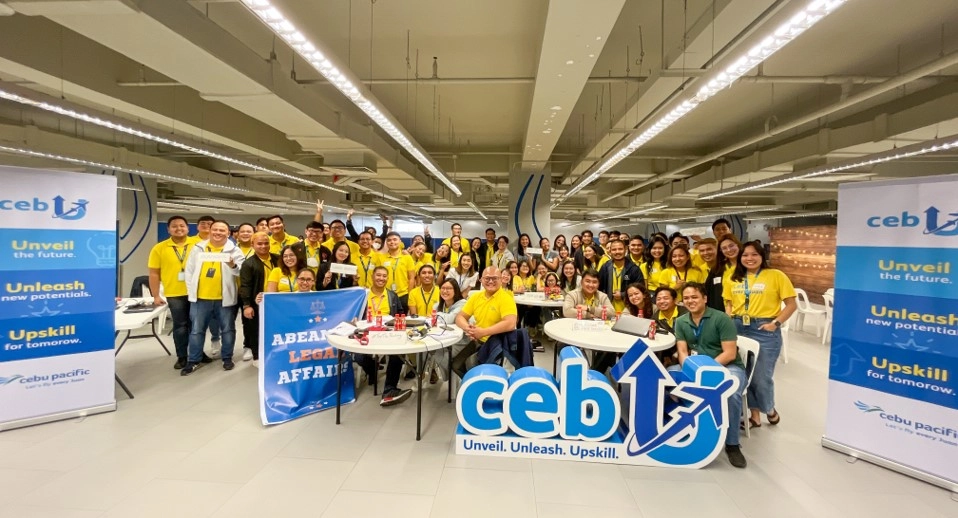
URC’s 2024 Growth in Talent Initiatives and Achievements
Learning Interventions for 2024 has been aggressive compared to 2023 across the organization (corporate and plant level). This is generally due to well-defined development needs of employees identified through the Advanced Planning process (for the executives) and the agreed Individual Development Plan as specified in the Year-End Performance Evaluation of employees in the previous year.
Leadership, Agile, and Commercial Programs
On the Leadership programs, three batches of the New Leaders Program were rolled out for newly appointed people leaders. This is essential for them to be equipped and given the mindset of how to be an effective people leader coming from an Individual Contributor role. Apart from this, more Leadership Programs for senior-level executives were participated in, both from the offerings of Gokongwei Group L&D and internal URC offerings. A total of 94 training runs covering Leadership and Commercial Courses were completed this year covering 1,849 participants. This translates to a 16% increase in training hours for Leadership and Commercial courses alone. Agile Courses, on the other hand, provided Agile Coaches and Product Owners a total of more than 5,000 hours this year.
Technical/Function Programs
Similar to Leadership and Commercial Programs, all the plants (BCFG, AIG, Flour, and SURE), including international counterparts in Malaysia, Vietnam, Thailand, Indonesia, and Myanmar, have all been able to render more time to address the development needs of its employees. An average of 15% increase has been posted compared to 2023 learning hours.
Learning Management System (LMS)
Another key development for 2024 is the wide offering of digital content offered by the Company’s LMS Platform which essentially drives self-paced development. Digital contents from the various established academies in the LMS have been uploaded while some old ones have been revisited and updated. This year also ushered in the creation of interactive in-house developed e-learning modules, making the learning experience more meaningful. A total of 7,000 hours has been contributed by the LMS platform. This is a promising figure considering all of the e-learning modules were only launched second half of the year. We are looking forward to a more heightened use of the LMS Portal for self-paced development this year.
External Recognitions for Total URC Human Resources (HR)
URC’s impact extends beyond internal benefits, as multiple external recognitions in 2024 validated its success. Achievements such as the Best Places to Work, HR Innovation Awards, and Employer Branding recognitions highlight URC’s commitment to creating an outstanding employee experience. In contrast to traditional HR models that function independently, URC’s efforts showcase a unified, people-centered approach that blends technology, engagement, and cultural excellence.
URC Honors Outstanding Projects at Annual UR Choice Awards
URChoice Awards recognizes outstanding efforts and contributions of teams and business units across the organization. In 2024, 16 awards were presented across categories such as Business Excellence, Game Changer, Organizational Transformation, and People Focus.
The event served as a testament to the dedication and commitment of URC employees, who consistently uphold the company's core values in their daily work. From innovative projects to transformative initiatives, each finalist demonstrated exemplary performance, making the selection process both challenging and rewarding. The accomplishments celebrated at the URChoice Awards serve as a reminder to continue pushing boundaries, embracing change, and maintaining an unwavering commitment to excellence.
As a result of all the efforts put in this year, our average learning hours per employee has improved by 13% from last year’s 26.7 hours to this year’s 30.3 hours, which is 26% higher than our year-end target of 24 hours.
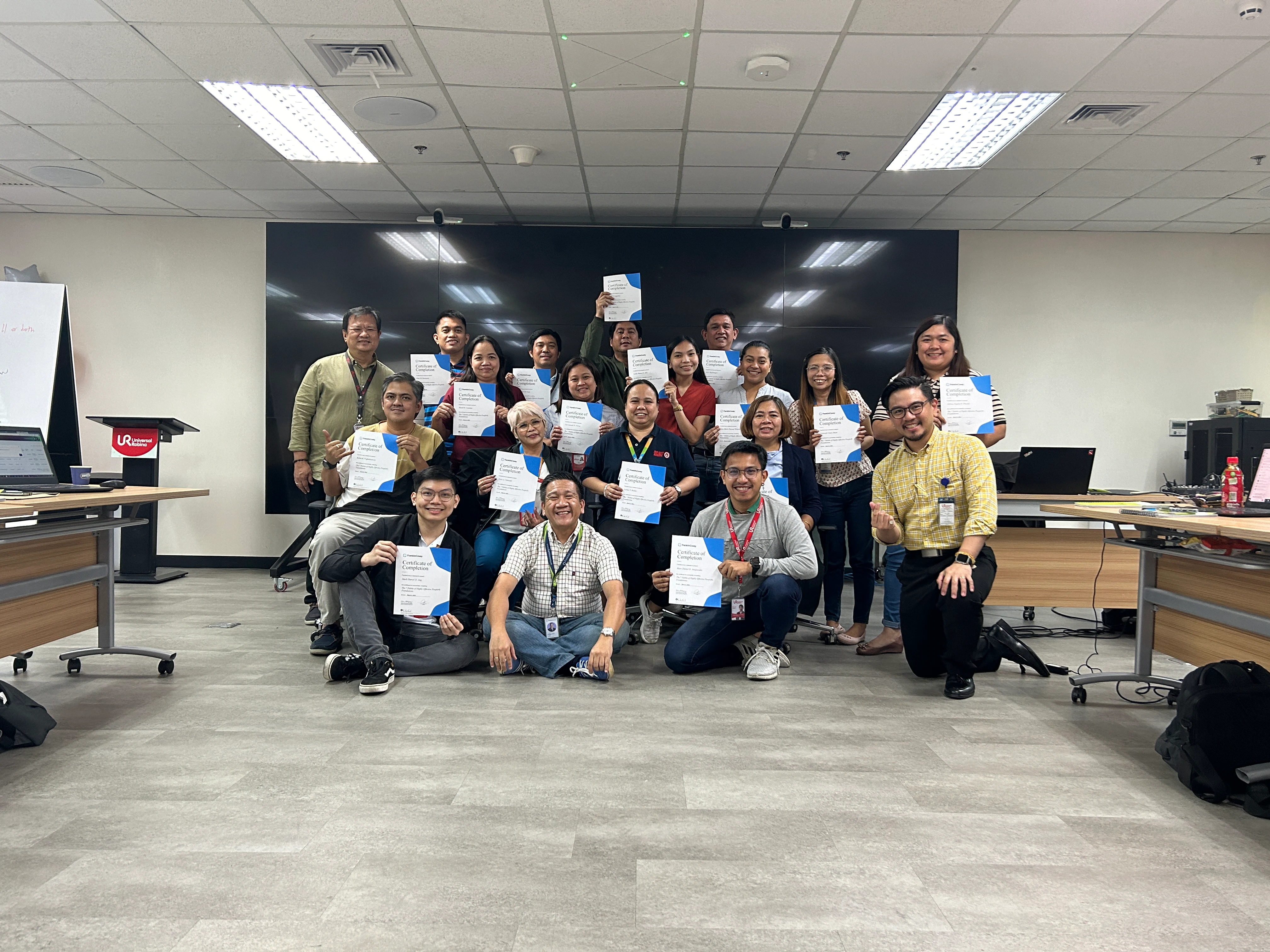
Employee Development Programs

Universal Robina Corporation
- 27 CEB U Programs
- 524 total training hours
- 1,044 unique learners
- Enhanced learning opportunities and skill development across all levels
- Prepare the workforce for future growth
- 90% activation rate within the first 90 days
- 22,418 Learning hours
- Democratized learning for all employees
- Skilled and agile workforce
- 50 First Officers
- Two batches of SkyCamp graduates from EFM
- EmpowHER (women empowerment)
- Rainbow Routes (LGBTQ+ inclusion)
- Sky Parents (support for solo parents)
- 297 employees have registered partners for travel benefit
- One for HMO program

Universal Robina Corporation
- Three batches of the New Leaders Program were rolled out for newly appointed people leaders
- 94 training runs covering Leadership/Commercial courses were completed, engaging 1,849 participants
- Agile Courses provided Agile Coaches and Product Owners with over 5,000 hours of training
- Plants across BCFG, AIG, Flour, SURE, and international counterparts (Malaysia, Vietnam, Thailand, Indonesia, Myanmar) increased learning hours by an average of 15% compared to 2023
- Launch of interactive in-house e-learning modules, contributing 7,000 learning hours despite being introduced only in the second half of the year
- Average learning hours per employee increased by 13%, from 26.7 hours in 2023 to 30.3 hours in 2024
- Exceeded the year-end learning hours target (30.3 hours vs. 24-hour target, a 26% improvement
- Increased employee engagement in learning and development programs
- Enhanced leadership capabilities and skill development across all levels
- Strengthened leadership pipeline and employee competency development
- Reinforced URC’s commitment to continuous learning and organizational excellence

Universal Robina Corporation
- Robust Talent Attraction and Retention
- Strengthening the Core
- Capability Development
- Values-led, Inspiring Leadership
- 13% increase in Employee Engagement Score (EES) to 70% from 62% last year
- 100% completion of Goals Setting as of February 2024
- 97% Completion of Values in Action 2.0 Roll-out by end of December 2024 (with a 4.82 feedback score)
- 15% Improved Employee Turnover Rate from 19.70 at the end of last year
- Improved EES and turnover rate through robust review of salary structure, competitive advantage, and total rewards approach
- Improved employee experience through employee recognitions programs, development initiatives
- Overall skills development and knowledge retention through commercial and operations capability building
- Embed Values and develop inspiring leaders through VIA 2.0, Leaders Bootcamp, and Leader Standard Work

Universal Robina Corporation
- Physical wellness
- Preventive healthcare
- Mental and emotional well-being
- Lifestyle support and holistic wellness
- Increased employee morale and participation in physical, mental, and preventive health initiatives
- Raised awareness of mental health and preventive care
- Convenient access to medical and wellness services on-site
- Fostered partnerships with fitness centers to offer exclusive employee wellness programs
- Enhanced mental health support by providing continuous access to resources and consultations
- Reinforced sustainability goals through health-oriented organizational strategies
- Customer Experience
- Sustainability and Social Impact
- Digital Transformation and Leadership Resilience
- Cross-industry knowledge sharing fostered innovative ideas and strategies
- Highlighted key sustainability and customer-centered efforts across subsidiaries
- Empowered employees through insights from experts and thought leaders
- Promoted employee recognition and motivation through upcoming initiatives
- Enhanced corporate resilience through shared strategies in digital transformation and customer experience
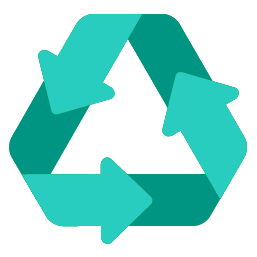
Resource Efficiency and Circularity
Natural materials remain fundamental to our operations, serving as critical resources that sustain our business activities across various industries. As we continue to grow, we recognize the pressing need to optimize resource use due to waste generated from various modes of procurement. Our commitment to resource efficiency and circularity drives us to implement innovative strategies that maximize the utility of these essential resources while minimizing waste and environmental impact.
We continuously explore technologies and best practices to reduce consumption and repurpose materials by investing in waste management solutions, recycling programs, and sustainable alternatives. JGSOC led its 16th International Coastal Cleanup® in Batangas, bringing together volunteers from various organizations to remove marine debris and protect coastal ecosystems. CEB advanced sustainability through fuel-efficient flight operations, waste reduction initiatives, and expanded use of biodegradable materials onboard. URC strengthened circularity with its Juan Goal for Plastic program and deepened its waste management partnership with Holcim and local government units. Water efficiency remained a key focus for URC, implementing rainwater harvesting, wastewater recycling, and reuse initiatives across multiple facilities. This holistic approach underscores our dedication to sustainable business practices that benefit both our operations and the communities we serve.
- 2024: 40% of plastic waste footprint
- 40% of post-consumer plastic footprint diverted
- 54 additional Collection Hubs in JGSHI and RRHI Facilities; Total Collection Hubs since 2022: 228
¹Plastic neutrality shall refer to a system or its desired outcome where, for every amount of plastic product footprint created, an equivalent amount thereof is recovered or removed from the environment by the product producers through an efficient waste management system. - EPR Law
URC’s Extended Producer Responsibility Strategy
In 2022, URC, together with JGSHI subsidiaries and affiliates such as Robinsons Retail Holdings, Inc., launched a comprehensive strategy to tackle plastic waste management. Leading this initiative, URC developed an end-to-end approach that emphasizes packaging circularity and actively engages communities in collection and diversion efforts. This strategy ensures compliance with the Extended Producer Responsibility Law and promotes the sustainability of the programs. This initiative highlights URC’s dedication to reducing its plastic footprint and advancing a more sustainable future.
Packaging Circularity
The company has ongoing efforts to reduce its plastic packaging footprint by:
- Redesigning packaging of its coffee mixes wrapper to be recycle-ready
- Reducing trim waste of total print width by incorporating tonal scales in wrapper design
- Reducing cut length of Great Taste Premium and Granule sticks
- Reducing the thickness of shrink wrap used for C2
- Light weighting of C2 bottles
URC also undertook initiatives to lightweight its Refresh water bottles, reducing plastic usage while maintaining product integrity. The Refresh 330 mL bottle, originally weighing 13 grams, was replaced with a 350 mL version weighing only 7.85 grams. Similarly, the Refresh 500 mL bottle was reduced from 16 grams to 8.85 grams. These efforts aligned with URC’s commitment to sustainability by minimizing plastic consumption and promoting resource efficiency in packaging.
Community Engagement and Collection Programs
URC recognizes that community engagement is essential to leverage ecosystem support and shared environmental goals. It also worked with local government units and communities to create programs on plastic waste management. The company also actively collects and recovers post-consumer plastic waste through programs like ‘Juan Goal for Plastic,‘ leveraging the Gokongwei Group ecosystem for its collection hubs.
Juan Goal for Plastic Program
URC initiated this program in 2022 to support the company’s contribution to address marine pollution. Its primary objectives include establishing plastic waste collection programs in selected pilot communities and developing a communication and training manual that other Strategic Business Units (SBUs) can use to launch their plastic waste collection projects. The key outcomes and positive impacts of these environmental initiatives include:
- Raising awareness and knowledge about plastic waste recycling in communities and providing long-term solutions to address the issue.
- Engaging communities and fostering partnerships with Local Government Units and Environment and Natural Resources Office partners.
- Increasing employee engagement and volunteerism within JGSHI and RRHI.
- Supporting compliance with the Extended Producer Responsibility (EPR) required by law.
- These initiatives have gradually made a positive impact, influencing thousands of Filipino citizens to become more environmentally conscious, contributing to a happier and healthier environment step by step.
Waste Management Partnership with Holcim
URC recognizes that addressing plastic pollution requires a comprehensive, circular approach, which can only be achieved through collaboration with organizations, private sector partners, institutions, communities, and local government units (LGUs). Through this shared understanding, URC continues to work with one of its existing partners, Holcim Philippines, as they endeavor to achieve this.
URC, particularly the ESMO Plant, and Holcim Philippines have been in partnership in the management of the plant’s industrial waste, wherein Holcim oversees the pre-processing and co-processing of waste material from the plant’s operations. This partnership enables URC ESMO Plant to divert its waste from the landfill and concurrently ensures its compliance with the LGU’s directive prohibiting landfill disposals.
Building on this existing partnership, URC and Holcim ventured into an enhanced waste management partnership, partnering with Local Government Units, to work together on a program to support and incentivize waste workers in its partner communities to improve the efficiency of segregation of municipal solid waste.
Through the tripartite partnership between URC, Holcim, and the LGUs, each player plays a role in the implementation of proper plastic waste management. This collaboration is a key component of the company’s strategy to manage plastic waste sustainably as well as fulfill its EPR Compliance. In 2024, URC and Holcim partnered with LGUs in Obando, Bulacan, El Salvador City and Sto. Tomas Pampanga. These partnerships positively impacted more than 100 waste workers across three LGUs.
Diversion Initiatives
As part of URC’s EPR strategy, the collected plastic waste from partner LGUs was processed through Holcim’s waste management arm—Geocycle. Using cement kiln co-processing, the plastic waste was converted into alternative fuels for Holcim’s cement kilns, integrating waste into industrial processes.
Through these collaborative efforts, URC continues to advance its commitment to sustainable waste management, landfill diversion, and circularity, demonstrating the power of strategic partnerships in creating a lasting environmental impact.
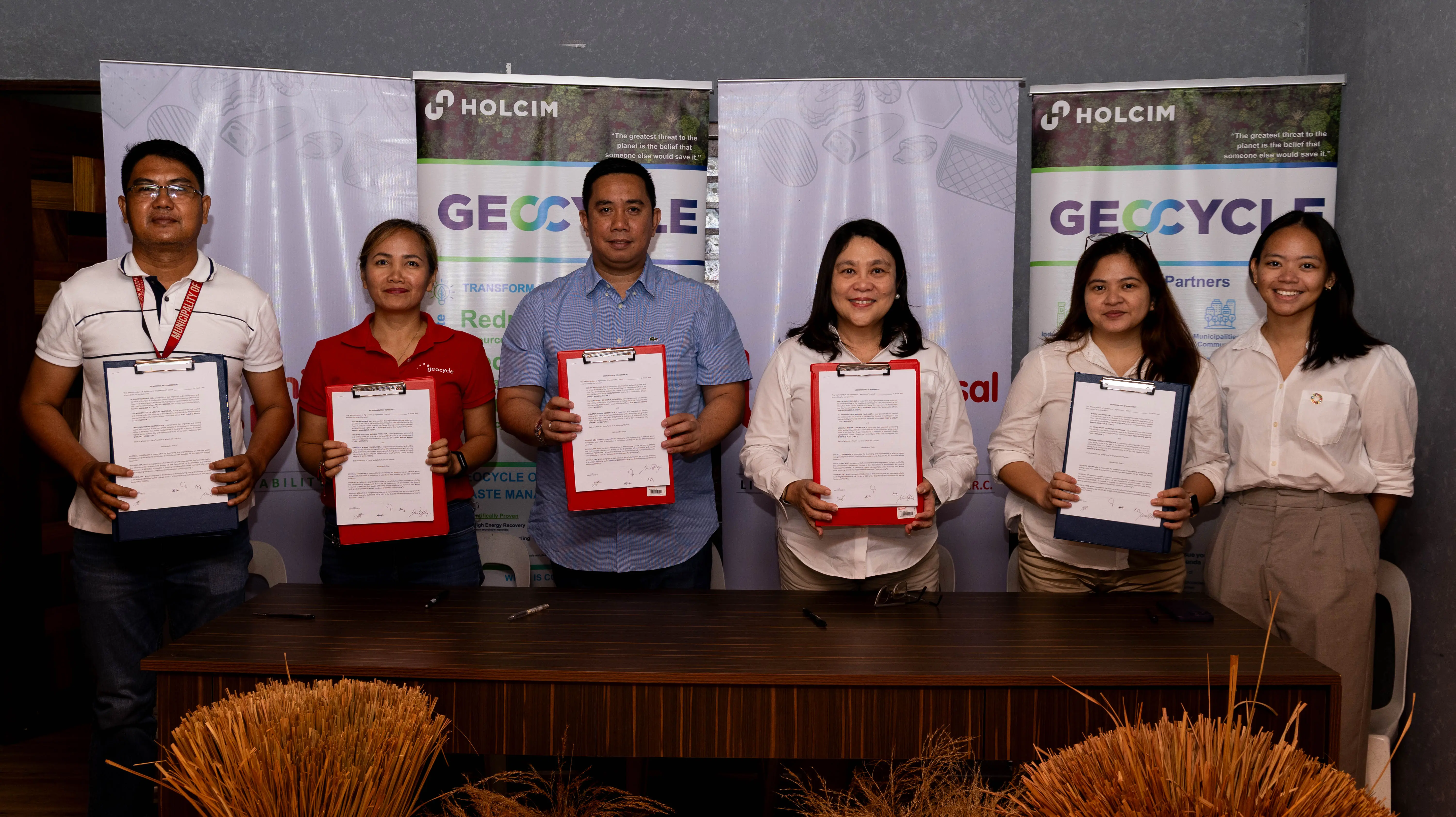
URC’s Commitment to Water Conservation: Reduction, Reuse, and Recycling
Reduction Initiatives
As part of the company’s ongoing efforts to reduce water consumption, URC installed rainwater harvesting units to continuously collect rainwater as an alternative source of water for basic utility cleaning activities in various sites across URC. In 2024, a total of 6,652.46 cubic meters of rainwater was harvested. The company also increased its water efficiency through its continued use of level controllers and automatic shut-off valves for feed water tanks in a number of Agro-Industrial Commodities (AIC) group sites. Additional actions around process improvements have significantly improved water usage, like utilizing recycled water, eliminating wastage, optimizing water-intensive cleaning activities, reducing frequent changeovers, to name a few. Leak detection and correction were also carried out in various sites across all business units, such as the underground pipe repair and replacement projects at Robina Farms and the rehabilitation of CMC water system in Flour Division.
The WaterCon projects for AIC were launched to help achieve year-over-year reductions which include several initiatives aimed at improving water management across different facilities. In Balayan, efforts focus on recovering cooling water, installing sub-meters in the factory, reusing treated wastewater for wet scrubbers, and implementing rainwater harvesting. At Robina Farm (RF), ongoing work includes repairing and replacing leaking underground pipes. The La Carlota Distillery (LCD) facility has resumed spent wash recycling, installed water meter, and corrected water line leaks. Meanwhile, at SONEDCO, leak detection and repair efforts are underway in both the mill and raw areas, along with repairing dilapidated roofing in these sections. Additionally, dry cleaning is conducted when necessary to optimize water use. Flour Davao has also installed high-level sensors in water tanks to automatically shut off the water pump when the tanks reach full capacity.
Re-Using Initiatives
To facilitate water reuse in its operations, URC has implemented steam recovery systems, including the construction of condensate lagoons and recovery lines for projects and make-up water at select sites. This process allows condensate to be returned and used for pre-heating boiler feed water. Additionally, Cleaning-in-Place (CIP) rinse water reuse and Reverse Osmosis (RO) reject water recovery systems have been established. Beyond these initiatives, the company also repurposes water for daily activities such as cleaning pallets, watering greenery, and flushing toilets.
Recycling Initiatives
Several URC sites minimize water wastage by utilizing treated wastewater in spray ponds and wet scrubbers and reusing the same for cooling tower systems. This practice is being implemented in SURE plants such as CARSUMCO, Balayan, Passi, SONEDCO, URSUMCO, La Carlota Sugar Mill, and La Carlota Distillery. Flour Pasig also utilizes barge ballast water to augment its water sources. The company also recycles water by using used water for the initial washing of key raw materials, such as unpeeled potatoes, one of the most water-intensive processes in its value chain. Additionally, wastewater effluent is repurposed as top-up water for cooling towers.
URC remains steadfast in enhancing and expanding its water conservation programs, reinforcing its commitment to achieving its water consumption targets.

Araw-Araw for a Greener Future by RLC
Robinsons Malls launched the Araw-Araw for a Greener Future initiative to embed sustainability into everyday activities, encouraging consumers to adopt eco-friendly habits in shopping, dining, and entertainment. By addressing critical environmental concerns such as waste management, climate action, and community engagement, the initiative reinforced the mall’s commitment to green operations while promoting consumer participation in sustainability efforts.
The campaign’s waste management and circular economy initiatives significantly expanded in 2024. The waste collection program grew from four malls in 2023 to 14 in 2024, diverting 79.63 metric tons of recyclables from landfills. Through a partnership with Basuhero, 17.76 metric tons of recyclables were recovered, with the generated sales value donated to the QC Kabahagi Center. The Recycling Market, in collaboration with the Department of Environment and Natural Resources (DENR), processed 18.12 metric tons of recyclables, contributing a portion of the sales to the RLove Foundation. Additionally, Reverse vending machines were installed in two malls, collecting nearly 16,875 PET bottles to support a circular economy, while the e-waste collection program, in collaboration with PLDT-Smart, ensured the responsible disposal of electronic waste. The Food Rescue Program rescued 426 kg of surplus food, preventing 1,076 kg of CO2 emissions and providing 1,787 meals to eight communities.
At the mall level, sustainability innovations were also implemented. The composting program processed 98.92 metric tons of fruit and vegetable scraps, repurposed 39.6 metric tons of paper and landscaping waste, and produced 103,800 liters of organic liquid fertilizer, along with 75,266 kg of natural compost. Robinsons Tuguegarao’s Waste Segregation Project preventing 148.68 metric tons of waste from reaching landfills and saving thousands per month on garbage collection fees.
Community engagement and cultural initiatives played a key role in fostering environmental awareness. Robinsons Malls actively participated in Earth Hour, saving energy and preventing CO2 emissions. Cultural engagement projects, such as mural painting activities across 17 malls, involved nearly 2,000 participants. The Dreamify Festival supported 14 artists, nine startups, and 28 musicians, blending environmental advocacy with cultural appreciation. The Biodiversity Escape Room, which educated 120 participants, won the ASPAC Creative Award 2024, while Project KaLIKHAsan showcased sustainable fashion, eco-friendly art, and environmental storytelling through film.
The Araw-Araw for a Greener Future initiative exemplified stewardship by integrating waste reduction, climate action, and community empowerment. Unlike conventional sustainability initiatives, it blended environmental responsibility with cultural engagement and interactive participation, ensuring long-term impact. In 2024 alone, 81.97 metric tons of recyclables were collected with the generated revenue reinvested in sustainability initiatives. The campaign also prevented greenhouse gas emissions and secured government grants for sustainability projects. By embedding sustainability into its core operations and consumer experiences, Robinsons Malls established a benchmark for environmental and social responsibility in the retail industry, demonstrating how businesses could drive meaningful impact through innovation and community collaboration.
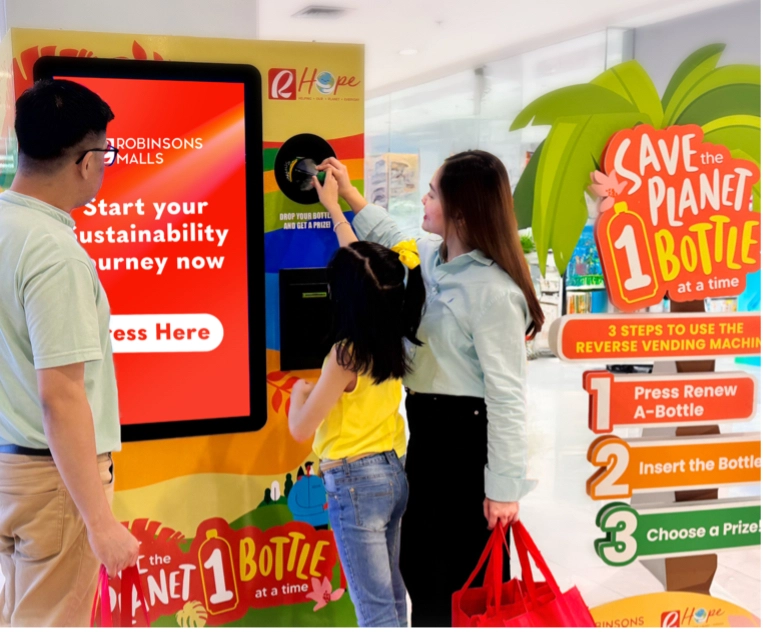
JGSOC’s Commitment to a Cleaner Coastline: The 16th International Coastal Cleanup® Day
Every year, the third Saturday of September marks a global movement dedicated to protecting marine ecosystems from pollution. This year, JGSOC once again took part in the 16th International Coastal Cleanup® (ICC) Day, reinforcing its commitment to environmental stewardship and sustainability.
The ICC is one of the largest volunteer-driven environmental initiatives worldwide, bringing together millions of participants from over 150 countries. The Philippines has been an active participant since 1994, and in 2003, the government institutionalized the event through Presidential Proclamation 470. JGSOC, recognizing the importance of preserving marine biodiversity, has been implementing this initiative annually since 2007.
This year, JGSOC’s ICC efforts focused on the coastal areas of Brgy. Simlong, Batangas City. The initiative gathered around 570 volunteers from various organizations, including industry partners such as the Samahan sa Pilipinas ng mga Industriyang Kimika (SPIK), the Philippine Institute of Chemical Engineers Inc. – Batangas Chapter, the Philippine Coast Guard, students from Batangas University, and community members from Batangas City. Their collective efforts resulted in the removal of approximately 1,460 kilograms of trash from the shoreline.
The primary objective of the cleanup is to reduce marine debris that threatens the biodiversity of the area’s coastal waters. By removing waste materials, the initiative helps prevent pollution that could harm marine life, disrupt ecosystems, and affect local communities relying on these waters for their livelihood.
JGSOC’s participation in ICC is not a one-time effort but a continuous commitment to sustainability. The company has been conducting this project annually for over a decade and remains dedicated to fostering environmental awareness and action among its employees and stakeholders.
As JGSOC looks ahead, it remains steadfast in its goal to create a cleaner, healthier marine environment for future generations. With each volunteer-driven cleanup, the company strengthens its resolve to be a responsible corporate citizen, championing sustainability one coastal cleanup at a time.
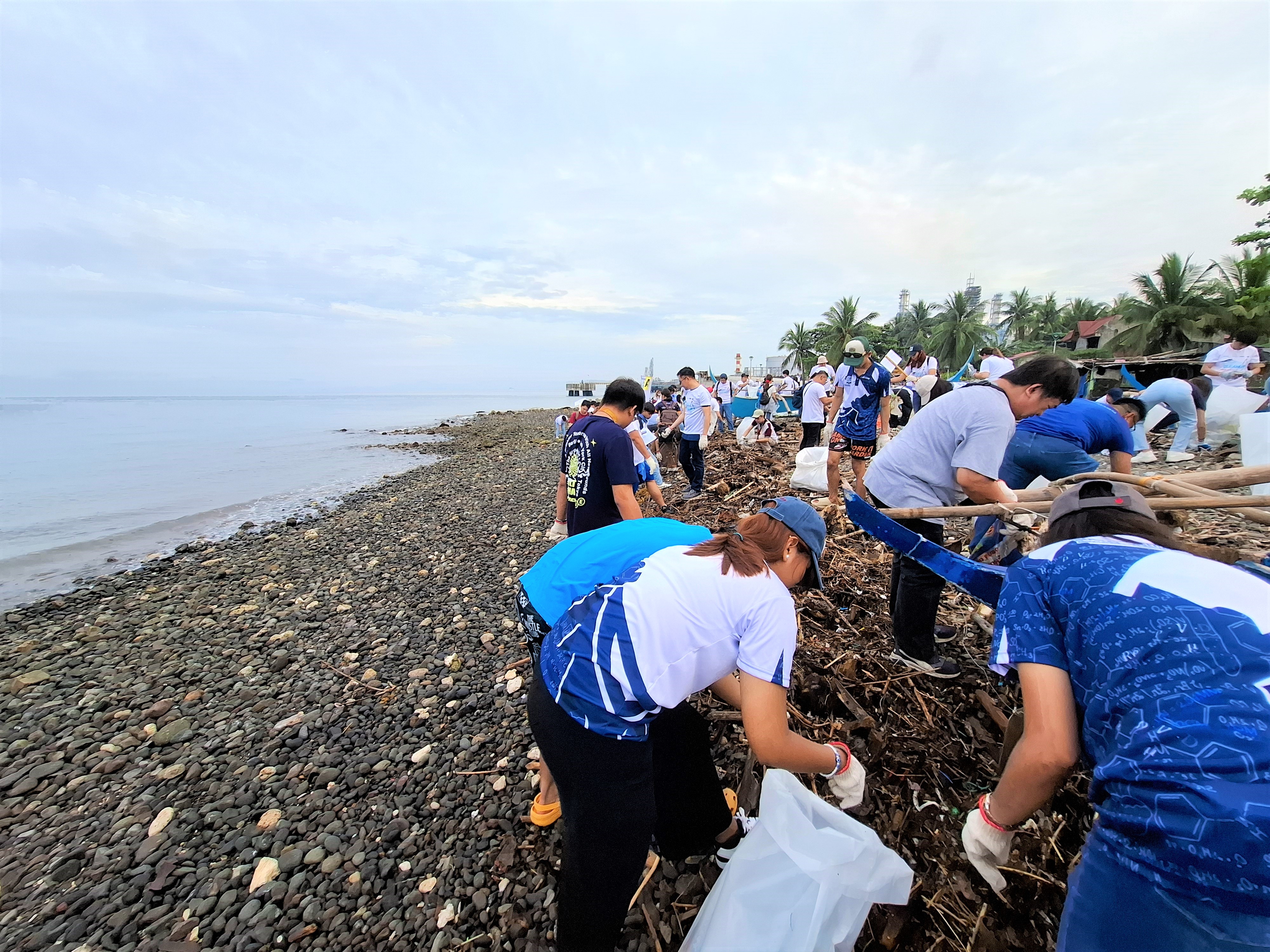

Universal Robina Corporation
- Reduced flaps at landing
- Continuous descent approach
- Single-engine taxiing
- Reduced acceleration altitude
- Idle reverse thrust
- Optimized fuel load

Universal Robina Corporation
- 36 metric tons of plastic waste were collected
- Over 30 collection sites activated across URC’s facilities and its partner communities
- Increasing awareness about plastic waste recycling in communities and providing long-term solutions to address the issue
- Engaging communities and fostering partnerships with Local Government Units and Environment and Natural Resources Office partners
- Partnership with Holcim to support LGUs in co-processing of laminates
- Building on this existing partnership, URC and Holcim ventured into an enhanced waste management partnership which was extended to include the involvement of Holcim’s existing LGU partners
- Management of Post-Industrial Waste through co-processing
- Supporting LGUs’ Management of Plastic Wastes
- Installed harvesting units continued to be utilized to act as alternative sources of water for basic utility cleaning activities in various sites across URC
- Continued use of level controllers and automatic shut-off valves for feed water tanks in several Agro-Industrial Commodities (AIC) group sites
- Leak detection and correction were also carried out in various sites across all business units
- Steam recovery systems such as the construction of condensate lagoon and lines to recovery projects and make-up water have been put in place in select sites. This process returns condensate to be used as boiler feed water pre-heating.
- Cleaning in Place (CIP) Rinse Water Reuse and Reverse Osmosis (RO) water reject recovery were also established. URC reuses its water in daily activities such as cleaning pallets, watering the greenery, and for toilet-flushing.
- Several URC sites minimize water wastage by utilizing treated wastewater in spray ponds and wet scrubbers and reusing the same for cooling tower systems. This practice is being implemented in SURE plants such as CARSUMCO, Balayan, Passi, SONEDCO, URSUMCO, La Carlota Sugar Mill, and La Carlota Distillery. Flour Pasig also utilizes barge ballast water to augment its water sources. The company also recycles water by using used water for the initial washing of key raw materials, such as unpeeled potatoes, one of the most water-intensive processes in its value chain. Additionally, wastewater effluent is repurposed as top-up water for cooling towers.
- 6,652.46 cubic meters of rainwater was harvested
- 10% of wastewater was recycled and reused
- Increased its water efficiency
- Reduction of water withdrawal from other sources

Universal Robina Corporation
- 14 RLC Malls, one office for plastic waste recovery
- Total volume of plastic waste recovered: 10.67 MT
- Increasing awareness about plastic waste recycling in communities and providing long-term solutions to address the issue
- Engaging communities and fostering partnerships with Local Government Units and Environment and Natural Resources Office partners
- Total Compost produced: 93,554 kg
- Total Liquid Fertilizers produced: 161,524 liters

Universal Robina Corporation
- Significant reduction of marine debris in the targeted coastal area
- Promoted a culture of shared responsibility in preserving natural ecosystems
- Oily water treatment system ensuring efficient recovery of oil in wastewater
- Recovered oil hauled by/sold to accredited haulers/buyers
- PHP 1,530,00.00 cost savings in handling, treatment, and disposal of hazardous wastes
- 153,000 liters of oil recovered and sold to the company’s accredited buyer
- Oily water treatment system ensuring efficient recovery of oil in wastewater
- Recovered oil hauled by/sold to accredited haulers/buyers
- Launched in collaboration with URC UFLEX to promote plastic waste reduction
- Conducted collection drives in Brgy. Pinamucan Proper and Brgy. Mabacong, Batangas City
- Strengthened community engagement in environmental stewardship
- Promoted a culture of sustainability and responsible plastic disposal

Climate Action
Climate change is one of the most pressing global challenges in current times, requiring immediate and sustained action. We actively seek innovative solutions and forge strategic partnerships to transition towards a low-carbon economy while maintaining operational excellence.
By embedding climate-related risk management into our business model, we aim to not only mitigate environmental hazards but also create long-term value for our stakeholders. Each SBU has developed ways forward to integrate climate resilience into their business models. CEB is modernizing its fleet with NEO aircraft, electrifying ground support equipment, and transitioning key facilities to renewable energy, ensuring a more sustainable aviation industry. URC is optimizing boiler efficiencies, utilizing biomass and biogas as fuel alternatives, and renewing utility assets to drive energy efficiency and reduce reliance on fossil fuels. JGSOC is advancing its solar rooftop project. By prioritizing sustainable practices, we contribute to a climate-resilient future for our industry and communities.
Caring for Juan Planet - Cebu Pacific Leads Sustainable Aviation in the Philippines
Cebu Pacific (CEB) continues to lead sustainable aviation in the Philippines, showcasing a record performance in carbon emission intensity since 2019. An airline's carbon emission intensity measures the amount of carbon dioxide (CO2) emissions produced per unit of output, typically in grams of CO2 per revenue passenger-kilometer (gCO2/RPK). This key sustainability metric evaluates the environmental impact of air travel. It allows airlines to track improvements in efficiency and sustainability on a per-passenger basis, highlighting their progress in decarbonization efforts. The lower the carbon emission intensity, the more successful an airline is at reducing carbon emissions.
In 2024, CEB once again stands out among Philippine-based carriers for producing the lowest carbon emissions per passenger per kilometer. CEB achieved its best-ever carbon emission intensity performance of 80 gCO2/RPK, surpassing its previous record of 81 gCO2/RPK set in 2023. The airline also performs favorably compared to the global industry average. For context, the global average carbon emission intensity for airlines in 2019 was 90 gCO2/RPK, according to the International Council on Clean Transportation. CEB's success in reducing carbon emissions is driven by its Five F (5Fs) Decarbonization Strategy, which integrates emission reduction principles, perspectives, and programs across various aspects of the airline's operations.
Fundamentals
CEB’s low-cost carrier (LCC) model aligns with the aviation industry’s push for sustainability and emissions reduction. By using high-density aircraft configurations, the airline significantly reduces emissions per passenger. CEB leads the industry in operating the most efficient A330neos, maximizing seat density to achieve the lowest carbon footprint per passenger-kilometer. Additionally, CEB optimizes fleet deployment by matching aircraft to specific route demands, utilizing larger-capacity A330s and A321s for high-density and longer routes.
Fleet
CEB operates one of the youngest fleets in the industry, with an average age of just 5.9 years as of the end of 2024, compared to the global average of 10.1 years. Aircraft modernization is at the heart of CEB's decarbonization strategy. Newer models like the Airbus A320neo (New Engine Option) offer fuel savings of 15–20% compared to previous engine technologies. These fuel-efficient aircraft significantly reduce fuel consumption, lowering emissions per passenger. By the end of 2024, CEB had further modernized its fleet, with 53% of its aircraft (51 out of 97) now comprising NEOs, resulting in an estimated 49.7 million kilograms of jet fuel saved and 157,000 tonnes of carbon emissions avoided in 2024.
In addition to its aircraft modernization program, CEB has launched an electrification initiative for its ground fleet to further reduce CO2 emissions, including electric employee shuttles, passenger buses, and baggage tractors.
Fuel
CEB employs a variety of industry best practices to improve fuel efficiency across its operations, including optimized procedures for descent, taxiing, and cruise altitude. The airline also enhances fuel efficiency through flight optimization, taking more direct routes than traditional airways. Together, these strategies saved an estimated 10.8 million kilograms of jet fuel, avoiding 34,000 tonnes of carbon emissions.
CEB also pioneered the use of sustainable aviation fuel (SAF) in the Philippines, becoming the first low-cost carrier in Southeast Asia to incorporate SAF into its commercial operations, starting with a flight from Singapore to Manila in October 2022. SAF, an alternative to traditional crude-based jet fuel, can reduce CO2 emissions by up to 80%. Today, CEB uses SAF for all its new aircraft deliveries from Airbus.
Footprint
Beyond managing carbon emissions from jet fuel, CEB actively reduces emissions across other areas of its operations. The airline has transitioned two key facilities, the Aplus and AirJuan buildings, to renewable energy sources, reducing electricity-related emissions. These facilities support CEB's maintenance, ground handling, and catering operations.
Finance
In 2024, CEB made history by securing Southeast Asia's first sustainability-linked loan (SLL) for a low-cost carrier, reinforcing its commitment to decarbonization. Under the loan agreement, CEB committed to sustainability performance targets to further reduce its carbon emission intensity. Achieving these targets will unlock financial incentives to support the ongoing modernization of CEB’s fleet.
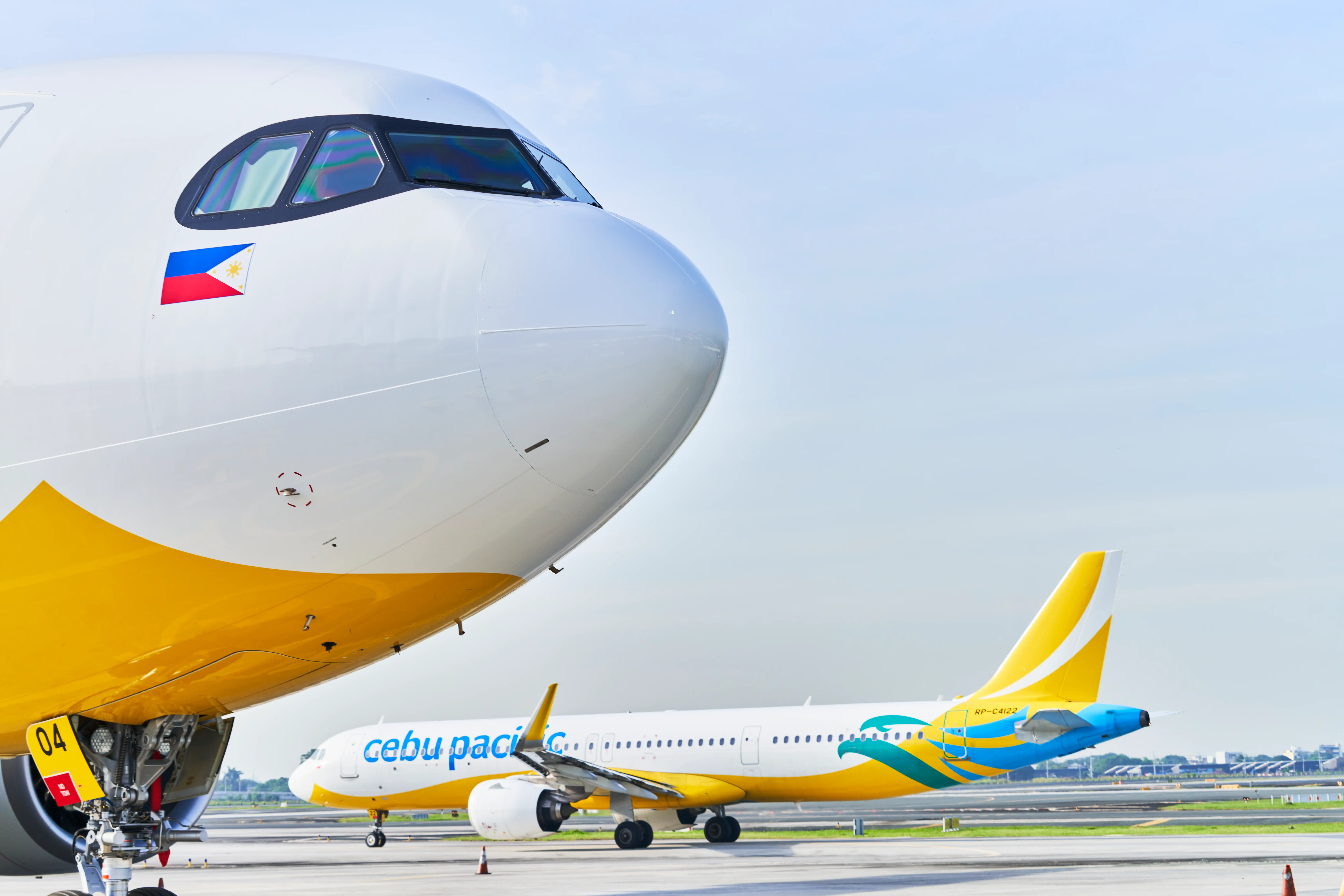
URC’s Climate Action Program
The Climate Action Program is URC’s mechanism to facilitate GHG reduction efforts geared towards identifying initiatives to reduce Scope 1 and 2 emissions. Kicked off in 2024, key functions across all URC business units globally were trained on GHG fundamentals such as inventory and accounting, and key decarbonization levers. Business units were onboarded on URC’s Climate Action priorities, goals, and key activities. The Climate Action Program streamlined energy-savings and RE adoption projects in the pipeline to measure its contribution to GHG reduction for URC, grouping them into decarbonization levers, providing a baseline view of the impact of future projects.
Since 2020, URC has seen reductions in its GHG emissions. These reductions are attributed to the mentioned initiatives under the Energy consumption portion. In addition, adoption and increase of renewable energy in the company’s energy mix remains to be one of the key strategies to reduce emissions.
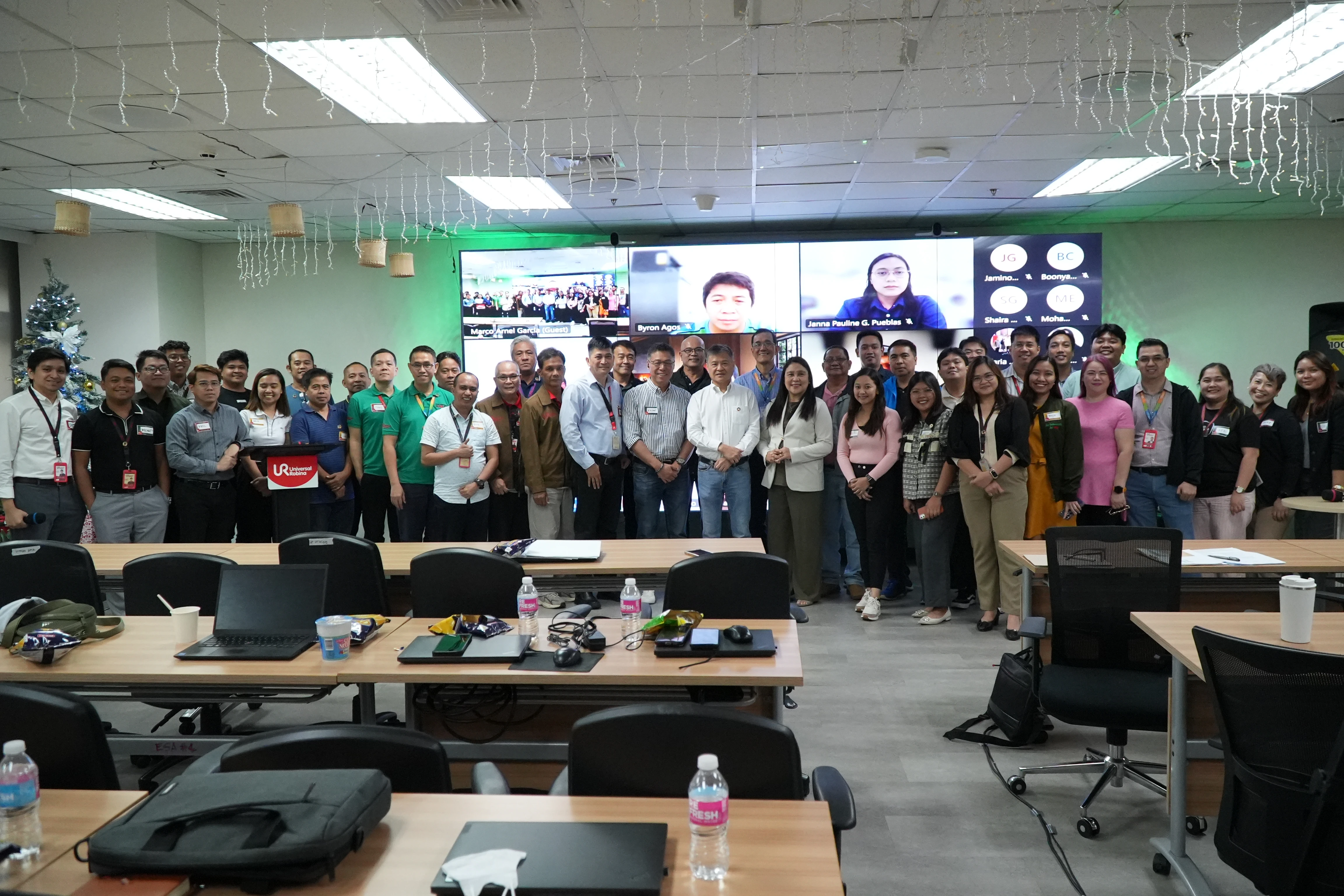
RLC Residences Announces Climate Target by 2031
RLC Residences announced the development of 1 million square meters of resilient condominiums by 2031. This initiative was shared by RLC Residences Senior Vice President Chad Sotelo at the International Finance Corporation’s 2nd Climate Forum. The initiative will focus on implementing green building measures and achieving EDGE certification together with an advisory by the International Finance Corporation (IFC).
RLC Residences’ first EDGE-certified project, Le Pont Residences in Bridgetowne, highlights their commitment to sustainability. Despite being new to sustainable residential developments, RLC Residences has already achieved preliminary EDGE Certification for Le Pont Residences Tower 1 in Pasig City. This certification recognizes the project's energy and water efficiency measures, sustainability features, and lower carbon design for future homeowners.
Chad Sotelo expressed gratitude for IFC's support in understanding and improving sustainability and resilience in their residential projects. He emphasized that sustainability has been a focus since 2022, and the partnership with IFC is helping them integrate these practices into their day-to-day operations. This collaboration is seen as a significant step towards creating more sustainable and resilient living spaces.
Ommid Saberi, IFC’s Global Lead for EDGE and Building Resilience Index, commended RLC Residences' commitment to green and resilient initiatives. He highlighted the importance of incorporating climate resilience practices into building design and construction, especially in disaster-prone areas like the Philippines. The EDGE certification aims to empower developers to build sustainable properties through cost-effective and environment-friendly means while delivering high-quality buildings.
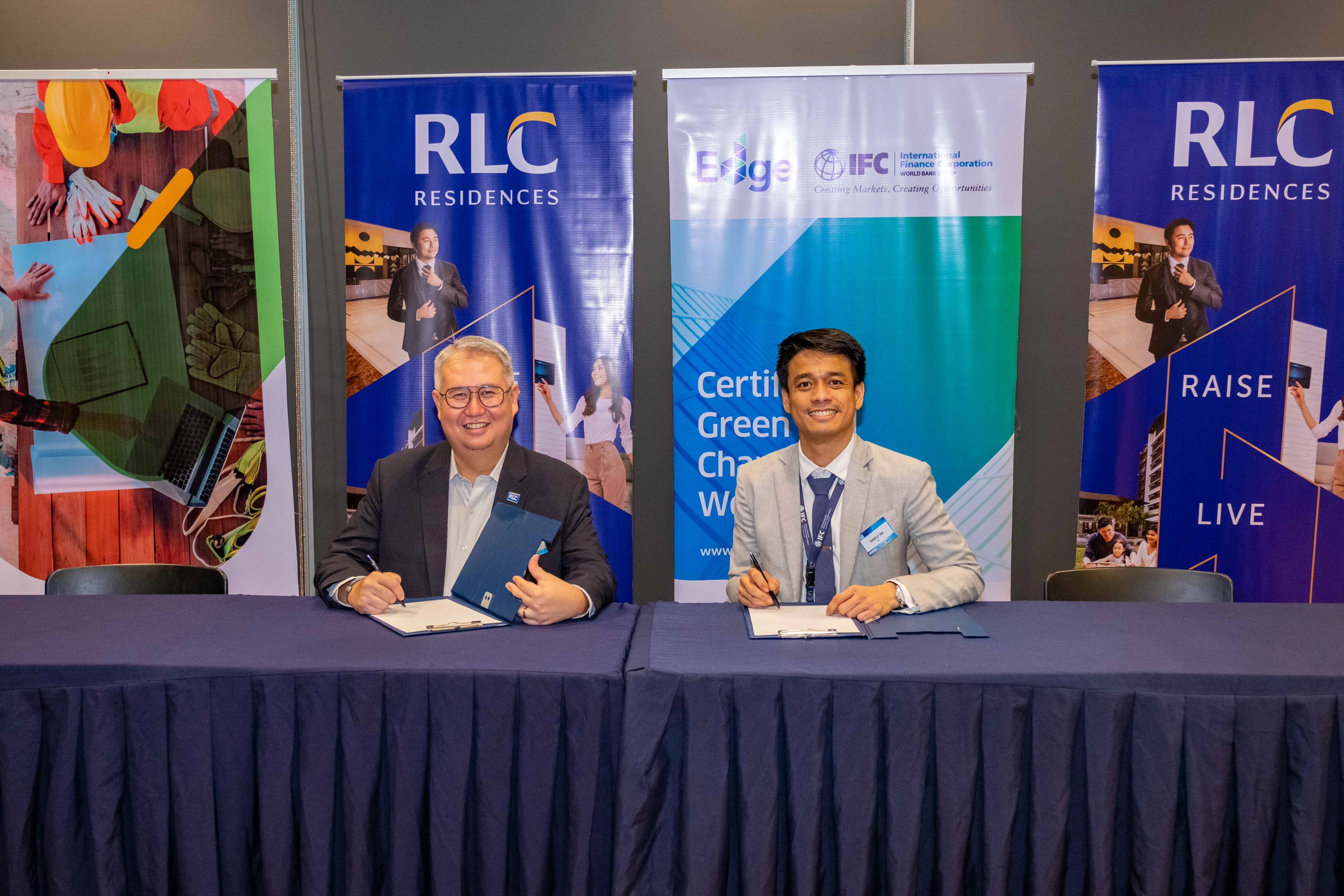

Universal Robina Corporation

Universal Robina Corporation
- Improving boiler efficiencies, religious execution of preventive maintenance, and conduct of audits
- Capability building was conducted focusing on review and standardization of operating procedures
- Boiler operators are trained and qualified to ensure highly skilled personnel and best-in-class boiler operations
- Delivered substantial improvements, reducing the business unit’s energy consumption by 15% and 3%, from coal and diesel respectively
- Boiler efficiencies improved by 13% compared to 2023 numbers, contributing a PHP 73 million cost avoidance for boiler fuel usages
- Sugar & Renewables (SURE): Bagasse, a by-product of sugarcane milling, is used as fuel for the boilers in the SURE plants, producing steam and electricity. In its Distilleries, another by-product called spent wash is used as fuel to boilers while a portion undergoes bio-methanation process producing biogas.
- Agro-Industrial Group (AIG): In our farms business, discarded animal wastes are converted into biogas and is used to generate electricity
- Branded Consumer Foods (BCFG): Coffee spent grounds, spent tea leaves, and sludge are some of the by-products utilized by our plants in San Pedro, Calamba, and Vietnam
- Review of assets in terms of reliability and resource efficiency
- Define master plan for utility system set-ups
- Serve as reference for new plants and installations
- Renewal of utility assets and equipment (such as compressors, chillers)
- 18 out of 21 projects planned with an estimated investment of PHP 1,003 million
- Generated 78,760 GJ of energy savings with an equivalent to PHP 216.9 million in annual cost savings
- Facilitate GHG reduction efforts geared towards identifying initiatives to reduce Scope 1 and 2 emissions
- Kicked off in 2024, key functions across all URC business units globally were trained on GHG fundamentals such as inventory and accounting, and key decarbonization levers
- Business units were onboarded on URC’s Climate Action priorities, goals, and key activities
- Solar panel installations in 12 of URC’s facilities with a combined capacity of 18.1 MWp
- Three Solar projects were added in 2024 located in Myanmar, Malaysia, and the Philippines
- Installation of 1 MW ground-mounted solar farm in the La Carlota Distillery Plant in Negros Occidental
- Investments in solar energy projects contributed 63,173GJ to URC’s total energy usage in 2024
- Avoiding 6,217 tCO2e in GHG emissions if the same quantity was purchased from the grid
- Signed an agreement with Retail Electricity Suppliers (RES) to supply 21 URC local facilities with electricity generated from solar and geothermal energy
- URC Vietnam formed a Power Purchase Agreement (PPA) that provides one of its plants with electricity generated from solar energy, bought at a lower rate compared to average market price
- Increased climate resilience in local communities
- Increased absorption of carbon dioxide
- GREEN Excellence in Environment is awarded to a URC facility/plant and Pollution Control Officer (PCO) with high optimization and responsible resource management in terms of energy and water consumption, waste management and environmental compliance
- Recognized as best-in-class facilities in Government and Legal Compliance, Resources Optimization (Waste Minimization), Efficient Water Use, Energy Efficiency and Nature Protection

Universal Robina Corporation
- Accelerated transition toward sustainable residential developments
- Improved disaster resilience of future homes in high-risk regions like the Philippines
- The total installed capacity stands at 31,581.28 kWp
- The total capacity of solar plants currently under development across four malls is 6,480.81 kWp
- The target capacity of upcoming solar plants across four new malls is approximately 4,500.00 kWp
- Total energy production to date is 195,204,834.27 kWh across all 29 plants
- The total CO2 emissions avoided amounts to 138,342.57 metric tons
- This reduction is equivalent to planting 2,287,446 trees

Universal Robina Corporation
- Annual energy savings of 17.8 GW-hours
- Reduction of 17,000 metric tons of CO2 emissions annually


















